One of the questions I’m often asked by readers, is how to pick a blog niche.
What is a blog niche?
A blog niche is a carefully selected topic area that you’ll be focusing your blog content around. In simpler terms, picking a blog niche is really just another way of answering the question, how do you decide what to blog about?
See my full list of niches to blog about for more inspiration. This is a pretty important question to answer as you’re very early on in the process of starting your blog… because it could ultimately be the deciding factor that determines the future success (or failure) of your blog.
While some bloggers simply write about whatever pops into their minds, that’s not a great blog strategy for long-term success. Especially if you want your blog to eventually generate income and become something more than just an online diary with a small handful of readers tuning in for your musings.
Instead, you need to pick a blog niche—a clear topic area that you’re going to focus all of your content on, in order to establish what your readers should expect from you.
How to Pick a Blog Niche (60+ Blog Niche Ideas) in 2023
- What is a blog niche?
- 60+ Blog niche ideas with proven demand
- How narrow (or broad) should your blog niche be?
- How to brainstorm blog niche ideas
- 9 Key questions to answer when picking a blog niche
- 4 Smart ways to validate your blog niche idea (before you launch)
- 23 Profitable blog niche examples: What makes for a successful blog niche?
- How will you pick a blog niche today?
Disclosure: Please note that some of the links below are affiliate links and at no additional cost to you, I’ll earn a commission. When you purchase a product or service using my affiliate link, I’m compensated, which helps make content like this free of charge to you. Know that I only recommend products and services I’ve personally used and stand behind.
60+ Blog Niche Ideas with Proven Demand and Profit Potential in 2023
I know first-hand that picking a blog niche to focus on can sometimes be a bit of a challenge. I’m also frequently asked by my readers here for advice on which niche they should choose—given their particular skills, interests and experience. To help spark your imagination, here are some time-tested blog niche ideas that already have proven demand.
Here are 60 blog niche ideas (with proven demand) that you can use today:
- Personal finance, getting out of debt, responsibly using credit cards
- Investing and navigating the stock market, frugal living, minimalism
- Small business marketing advice, tax tips, digital advertising, sales coaching
- Healthy eating & nutrition, general healthy and wellness, spirituality, meditation, yoga
- Recipes and meal prep tutorials, exploring restaurants in your city/area (general food blogging)
- Running, hiking, trekking, camping, mountaineering, rock climbing, biking, skating
- Traveling, backpacking, digital nomad life, luxury hotel tours, solo traveling, sightseeing Europe (travel blogging)
- Fitness, weightlifting, endurance sports, training for athletic events
- Outdoor photography, portrait photography, wedding photography
- Basketball, football, baseball, soccer, golfing, tennis, volleyball, hockey
- Parenting, raising children abroad, solo parenting, advice for fathers (dad blogging), or mothers (mom blogging)
- Action movie critiques, popular tv show discussions (like Game of Thrones), video games
- Self-improvement, book reviews, productivity, career advice, interview tips, lifestyle blogging & personal blogging
- Relationships, marriage advice, psychology, science, physics, astronomy and more…
Here’s a video walking through my explanation of these blog niche ideas:
Keep in mind that a great starting point when considering whether or not particular blog topic ideas you’re interested in could be considered a smart niche to blog about, is whether or not a lot of people share that interest with you. If there’s a sizable audience already seeking answers on a particular subject matter, then you’ve got the makings of a great (possible) blog niche.
Throughout the rest of this guide, we’ll cover how to research & validate your blog niche to make sure you’re going down the right path.
Once you’re ready to test your blog niche and start the process of actually building your blog—head over to my ultimate guide to starting a blog.
Want to Start Your Blog (the Right Way)?
Check out my ultimate guide How to Start a Blog (on the Side).
Now, let’s dive in to my guide on how to pick a blog niche!
How Narrow (or Broad) Should Your Blog Niche Be?
When you’re choosing a blog niche, you want to pick a topic area that you can write about weekly or even daily for years to come.
That means that a very narrow niche, like “Marvel Avengers iPhone Cases,” probably isn’t going to work well in the long run.
It might be great at first as you’re not competing against a high volume of sellers, but you’ll probably struggle to find enough design inspiration, customers and you may even get bored just creating the same types of content & designs over the months (and years) to come.

With a subject matter like this example, you’d be better off broadening your blog niche to include “movie and television-related iPhone cases.” Within this broader niche, you can still include all of the Marvel cases you want, but you’re also giving yourself permission to expand into got many other closely related titles.
Of course, it’s definitely possible to go too broad with a blog niche (time to niche down).
According to recent blogging statistics, there’s an estimated 31.7 million bloggers now that we’re heading into 2023. That makes picking a clear blog niche more important than ever.
That means if your blog covers a massive topic like “health” or “business,” then you’re going to really struggle in building a focused target audience and carving out your own readers.
Instead, you’ll want to narrow down to something much more focused—maybe instead of “health,” you can pick a blog niche like “living with diabetes” or “losing weight through nutrition.” Plus, you’ll be able to cater your blog name to a more clear niche too—which ultimately helps brand yourself for readers.
Instead of “business” as a broad topic, you could focus your blog niche specifically on “starting a side business” or “how to make money online” where your content can have more clearly defined guardrails that keep you on-message for what your audience will come to expect.
Now that we’ve got a sense of how to pick a blog niche without the risk of going too narrow or too broad, let’s brainstorm some blog niche ideas that’ll help you appropriately niche down.
How to Brainstorm Blog Niche Ideas (with Proven Demand)
Some bloggers know what they want to write about immediately. They want to start a blog based on a fiery passion, or one that ties in with an existing business venture.

Other brand new bloggers don’t have a clue yet (and that’s ok)!
They’re still learning what a blog really is, and all they know is that they want to blog about something.
If that sounds like you, or if you already have a niche or two in mind—but want some more possibilities, here are a few great ways to brainstorm blog niche ideas.
Try My Free AI-Powered Blog Idea Generator Tool

Writer’s block can be a real pain. Trust me, I know. That’s why I built this forever free blog post idea generator tool, powered by AI. In seconds, you can generate endless ideas for your next blog posts.
1. Write Down a List of All the Things You’re Interested In
What do you love to do or to talk about?
Jot down all the things you’re most interested in, whether or not you think it would make a good blog niche. We’re just thinking about all of the possibilities at this stage.
It’s fine if some of your niche ideas feel very general and others weigh in as a more specific niche. No ideas are bad ideas at this stage.
Your list might look something like this:
- Small businesses
- Game of Thrones
- Golf
- Camping
- Traveling (especially in Europe)
- Quentin Tarantino movies
Once you’re looking at your list, you’ll probably find that some of your ideas would make better blog niche topics than others.
You may even find there’s one potential blog niche in particular that stands out for you—put a star next to that one to come back to soon. Side note: If you’re ready to start generating content ideas and begin writing, check out this list of the 201+ Best Blog Post Ideas You Can Write About Today. And remember, if you’re blogging about topics you’re personally interested in, that’s the recipe for not only faster writing, but a more enjoyable experience for both you and your readers.
2. Think About the Blogs, Magazines and Books You Read
What blogs do you read avidly? Which magazines do you subscribe to? How about (non-fiction) books you’ve read recently?
You may have a wide range of different interests, or you might find that all your reading focuses on one general area (i.e. “personal development”) that could help you move toward a particular blog niche to focus your brainstorming around. Check out my top blogging book recommendations to see if they help spark something too.
Write down the topics and blog headlines of all of the sites, magazines and books you’ve read (even if they’re hiking books)—then see if they bring up any clear ideas for your blog’s niche. If you’re coming up short on headline ideas, try my free blog title generator to come up with dozens of ideas for how to position your articles—and then you can even use my AI writer to create great first draft articles in seconds.
3. List Your Past Jobs, Hobbies, and Experiences

What jobs have you done during your life? Write them down (even if they seem mundane).
What about your hobbies? Perhaps you love miniature wargaming, or you’re a keen gardener. Maybe you play an instrument, or you’re on several amateur sports teams. Write these all down.
While you might not want to start writing blog posts about your actual job, you might find that there are elements of your jobs or hobbies that you do want to blog about, or a core thread that ties several elements of your life together.
Maybe you’re a designer in an ad agency, you play in an orchestra, and you enjoy sketching and painting—thus it could make sense for you to choose a blog niche focused on creativity. If you’ve had blogging jobs in the past, try and pull out some insights around the types of content you’ve enjoyed writing about most.
4. List Significant Things You’ve Accomplished
Many successful blogs teach a lot of people how to do something.
From Digital Photography School teaching people how to take better photos… to Mr. Money Mustache teaching people how to save up a stash of money so they can retire early (both of which we’ll talk about in the most profitable blog niches & examples below).
What significant accomplishments have you had? Perhaps you’ve:
- Lost weight and kept it off
- Got out of debt
- Run a marathon
- Remained married for 30 years
All of these are accomplishments that other people would love to have—and you could blog about how you achieved them.
5. Run Through a List of Perennially Popular Topics
If you’re still stuck searching for blog niche ideas, here’s a list that isn’t likely to go out of style anytime soon:
- Personal finance: including issues like debt, increasing income, trading stocks, reducing expenses, investing and navigating the stock market
- Health and wellness: which covers a huge range of areas, like weight loss, mental health, alternative therapies
- Parenting: including parenting at different stages: babies, toddlers, school kids, teens, adult kids, plus different parenting methods
- Self-improvement: which could be targeted at different age groups (e.g. college students, mid-life professionals, retirees) or at different philosophies or styles
- Building websites: this could incorporate your technical skills into writing about topics like how to make a website, what the best website builders are and more
While it’s not ideal to pick a blog niche simply for the sake of market demand, you may find something on that list jumps out as a topic to explore blogging about and eventually make your way into a more concerted niche over time (as you learn the nuances of the space).
9 Key Questions to Answer When Picking a Blog Niche
By now, you should have at least a loose idea in mind for a blog niche you could pursue–or perhaps a few different ideas for niches you could see yourself testing out.

Now, how do you know if your niche will actually translate into a successful blog that can attract readers?
Answer these questions right now in order to fully evaluate your potential blog niche.
If you hit a “no” on any of these—then it’s time to head back to the drawing board and find a new blog niche to write about.
Question #1. Are You Interested Enough in This Blog Niche?
Yes, it’s tempting to choose a blog niche idea that you think will be lucrative—like “credit cards” or “weight loss”—mere opportunities that you see popping up in ads all the time.
The problem with this approach, is that in addition to facing stiff competition, your interest will likely diminish over time.
You might build into your blog business plan to hire authors to write for you—but even so, you’ll need to grow the blog yourself (or invest a lot of your cash into it) until it becomes profitable.
Don’t pick a niche just because you think it’ll make money blogging.
Choose a niche you’re genuinely interested in. Something you’d enjoy writing about day after day for years to come.
While you may think your personal level of interest is relatively unimportant… compared with other factors, it’s actually so crucial that it’s the first test on this list. I couldn’t be more serious about the importance of only choosing to blog about topics you find interesting.
If you’re not genuinely interested in a niche, then there’s no point trying to blog about it—you won’t have the enthusiasm you need to carry it through the ups and downs in the years to come.
Question #2. Do You Know Enough About This Blog Niche?
If you’re going to build a successful blog, you need to be able to write blog posts that readers will find helpful—not content full of inaccuracies or misguided assumptions.
You don’t want to have to spend hours upon hours researching every line of your blog posts, and if you’ve done your homework to answer how much does it cost to blog, you probably won’t have the budget to hire expert writers to help you with all of your writing endeavors.
You want to choose a topic that you know a reasonable amount about. At least enough to hold a conversation on the subject.
Readers will also expect that you have at least some degree of experience (ideally expertise) within your blog niche. After all, would you want to learn cooking tips from someone who struggles to boil an egg, or blog SEO strategies from someone whose website never ranked above page 10 on Google?
In most blog niches, you won’t need formal qualifications. Readers will be perfectly happy to hear your “weight loss on a budget” advice as long as it’s based on your own hard-won personal experience. The same goes with how I’m able to offer up proven blogging tips, advice and best practices based on the real results I’ve been able to drive for my own blog here.
Most people won’t expect you to be a certified health professional, personal trainer or financial expert for that matter.
In certain blog niches though, readers will expect a degree of educational or professional qualifications.
If you’re starting a blog that covers legal matters or for example, blog tax advice—readers will expect you to be trained as a lawyer or accountant… or at the very least have heavily sourced quotes and advice from experts included in your recommendations. Take another example here with my guide of things I wish I knew before starting a blog.
Question #3. Is there a Paying Audience for This Blog Niche?
So you’ve got a niche you’re interested in and know a lot about… let’s say an obscure cartoon that you loved as a kid.

Before you launch a fan blog devoted to the cartoon though, it’s important to take a step back and ask a crucial question—is there a paying audience for this niche?
For a blog niche to work (assuming you plan to make money at some point), you need to first have an audience to promote your blog to… and have relative certainty that they’ll potentially spend money on products or services related to that niche—whether you create those yourself or not.
To establish whether or not a paying audience exists for your blog niche in question, ask yourself:
- Are there any books or magazines relating to this niche? Use a bit of common sense here: if there’s a self-published eBook with zero reviews and zero visibility on Amazon, then it’s probably not a sign that there’s a large paying audience out there. You’re hoping to evaluate whether or not others are already earning revenue in this space. Consider also that you could eventually sell online courses to an audience willing to purchase education materials on these popular blog topics.
- Are there products (or services) aimed at this audience? Let’s say you’re considering the blog niche—new parents of twins, which is based on your own experience. There are definitely products aimed at parents of twins (plus the vast majority of products aimed at any parents could work too). The existence of lots of products is (a) a sign that there’s a paying audience out there and (b) a source of potential advertising or affiliate programs to generate income for you. Affiliate marketing is a great way to monetize your blog, especially if there’s a heavily reviewed product or service in your blog niche (take for example my compilation of honest Bluehost reviews)—product reviews are a great way to monetize.
- Are companies advertising products related to your keywords? For instance, if the niche you’re considering is “organic gardening,” then you can type that into a free keyword research tool (or Google), plus other related phrases such as “gardening tools” and “organic pesticides.” Do any ads appear? If you can’t find ads for any (or many) of your keywords, then you might find this is a tricky blog topic to monetize. Pro tip: create Google Alerts for relevant terms you want to monitor in your niche.
If your answers to these questions still sound promising, then let’s keep moving ahead.
Question #4. How Many People Are Searching in Your Blog Niche?
If you haven’t already come up with any keywords, now’s the time to learn how to do keyword research.
What would people search for to find the type of content you’re going to write about (or the type of products you’re going to sell)? This is where blogging tools like my very own free keyword planner tool come in to play.
Use My Free Keyword Research Tool

Try my free AI-Powered Keyword Tool to get dozens of research-backed ideas for keywords & topics to write about on your blog today.
Once you’ve got some keywords in mind, it’s also important to check how popular those keywords actually are.
Use my free keyword tool to not only check monthly search volume for the keywords you’ll be blogging about, but get suggestions on other popular terms related to your niche.
Make sure you’re targeting your own country plus any other large countries that are relevant. For instance, if you’re in Australia but you’re planning to sell digital products that could be bought by a worldwide audience, you’ll want to also target the US and UK so you can see the combined level of searches from other English-speaking countries.
Any good keyword research tool will also suggest tons of other related keywords that you can evaluate. If some of them get way more searches than the keywords you’d previously thought of, you might want to shift your blog post ideas over to incorporate those higher priority opportunities first.
As a quick aside, if you’re having trouble with your content planning efforts, you can grab my free blog planner bundle and turn things up a notch today.
What’s a safe number of monthly searches to constitute a good blog niche?
If most of your keywords only get 100 people searching for them each month, you’re going to struggle to build a profitable blog.
But if you can combine all your top 10-20 keywords and get a total of 100,000 – 1,000,000 monthly searches… then you’re definitely on to something.
Question #5. Is This Niche Likely to Be Around for Years to Come?
While some blogs do manage to succeed while focusing on ephemeral trends, it takes time to build a popular blog.
You don’t want to end up starting again from scratch after six months, so aim to pick a blog niche that’s going to be around for years to come.
Building a whole blog around something that’s designed to be short-lived (like the 2024 Olympics) is unlikely to be worth your time. Similarly, building a blog around something that might vanish soon isn’t a great plan either. This is often the case with new social networks or with company initiatives: look at what happened to Google Authorship, for instance.
Make sure you’re building your body of work around a blog niche that’s going to last, or that you can pivot to take into account changes in your niche over time.
A good sign that a blog niche is going to stick around, is if it’s already been around for a while!
Anything that’s only come onto the scene in the last year or so, is best avoided as the niche topic for an entire blog.
If a new trend nicely rolls up into the greater niche you want to cover though, that’s a great opportunity to get in early on creating content on the subject.
Question #6. Is There a Moderate Amount of Competition (or More) in Your Blog Niche?
You might think that a good niche shouldn’t have too much competition—but the opposite is true.

If there’s no competition out there, or if the competition seems surprisingly lacking or amateur, then that could indicate that your niche just isn’t one that works well for a blog.
Other bloggers aren’t just your competition—they can also be your collaborators.
You’ll want to be able to guest post on larger blogs, for instance, and you might want to host webinars to invite bigger names in your niche to collaborate on growing your combined audiences.
Of course, if there’s tons of competition, that makes it important to distinguish your blog from all the others out there—by finding an angle or audience that isn’t as widely targeted.
Question #7. Is the Blog Topic Trending Upward on Google Trends?
Google Trends is a handy way to get a snapshot of public interest in potentially popular blog topics. Take for instance this trend graph on the popularity of blogging.
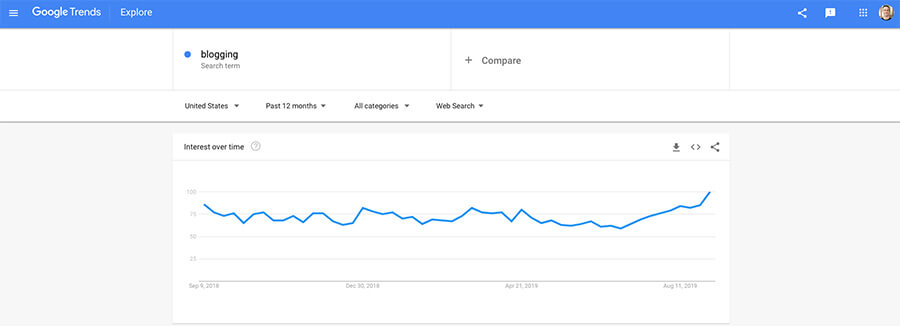
Simply type in your keyword and you can see whether it’s becoming more or less popular over time.
It’s best to avoid a blog topic that’s becoming steadily less popular (unless you have good reason to believe it’s about to capture people’s interest again).
If interest in a niche is static, that’s probably fine… but the ideal scenario is a niche that’s trending upward on Google Trends.
You can also compare search terms here, so if you’re deliberating between two blog niches, you may find it helpful to look at their relative popularity.
If the graph looks fairly flat for the past year, check the past five years (select the date ranges from the dropdown menu)—you might find that it’s been slowly declining in popularity.
Question #8. Would You Be Happy to Be Associated With This Blog Niche?
Although you could potentially blog under a pseudonym, it’s not generally a good idea to opt for a blog niche that you’d not want people to associate you with.
This could be because the blog niche is embarrassing in some way (let’s face it, not many of us would want to be known as the “bed-wetting blogger”) or it could be because it isn’t a good fit for another brand that you’ve already established—and you don’t want to upset your existing audience.
It could even be because you don’t want to be pigeonholed in a particular way (i.e. as a “mommy blogger”).
While you don’t necessarily need to announce your blog to everyone you know, it’s definitely an advantage to feel confident and happy sharing it with friends, family and people you already know online—this can really help increase your traffic in the early days.
So, think twice about a blog niche that you don’t feel comfortable having your name associated with.
Question #9. Does Your Niche Suit Evergreen Content?
Blog content can be divided into two broad categories: “evergreen” and “news.”
Evergreen content remains relevant for years to come, though it’ll need to be updated over time.
News content might be highly interesting for a short period of time, but quickly fades as other events transpire.
While there are, plenty of blogs that mainly publish news still, the opportunities for evergreen content make it easier to grow your site.
Instead of having to constantly publish new content to attract readers, your evergreen content can work hard at bringing people to your blog.
If your niche is going to rely on lots of fresh content to be published on a regular basis, think hard about whether you can do it justice.
Most news-focused blogs have a team of writers working for them, so they can keep up with the latest news and developments.
4 Smart Ways to Validate Your Best Blog Niche Idea (Before You Launch)
So you’ve now chosen a blog niche that you’re confident will give you a good chance of (eventually) monetizing the site.

There are plenty of other blogs, books, magazines and products related to it… and it’s something you’re genuinely interested in. But will you actually enjoy blogging about it?
Wouldn’t it be great if you could validate your blog niche before going through all the effort of making a website for it? Well, you can.
Here’s how to validate the blog niche ideas you’re considering—before spending hours launching your website.
Test #1. Come Up With At Least 50 Ideas for Blog Posts in Your Niche
Set aside an hour for yourself either in an empty room at home or in a quiet local coffee shop—and pick up a notebook & pen.
Write down as many blog post ideas as you can. You’re aiming for at least 50 ideas.
It doesn’t matter if some of those ideas seem a bit generic, or if you’ve seen them done elsewhere before… just try to get as long of a list as you can.
If you get bored half way through this exercise, or if you run out of ideas well before you make it to 50, then that’s a sign that this blog niche might not be the right choice for you. Because if your blog begins to get traction, you’ll eventually be writing a hell of a lot more than just 50 articles.
Test #2. Write a Couple of Guest Posts in Your Blog Niche
Once you’ve organized a list of ideas, choose a couple that you’d love to write about, and find blogs that would be interested in hosting an article from you—covering those blog topics as guest posts for their already existing readership.
As a lower-barrier option, you can set up a free Medium account or take to LinkedIn and write your test guest posts there to see how people in your network respond.
This is a great way to test out whether you enjoy writing about your blog niche—and it can also allow you to get some real-life feedback from readers about your content.
If you find it tricky to write these early guest posts, if you don’t really enjoy it… or if the feedback is surprisingly negative from the audience you get in front of, then it might be a good sign to rethink the niche you blog about.
Test #3. Start a Facebook Page (or Group) About Your Blog Niche
Another free, and straightforward, way to test out your niche is to create a Facebook page (or group).
You’ll want to give this page or group the same name as your intended future blog, so you can use it as your blog’s eventual Facebook page if you do go ahead with this niche.
This page or group is a great destination to share interesting links, ask questions and share tips relating to your niche. If you can attract a decent number of fans or group members to come and interact with you here, you’ll also find a continual source of new content ideas.
If you enjoy posting there and you start to build a bit of traction (with some likes, comments and shares), then that’s a good sign you’ll probably enjoy running a blog and managing a community within this niche.
Test #4. Draft Five Sample Blog Posts Related to Your Niche
Finally, once you make it this far, it’s time to start outlining blog posts and writing those articles to really test your mettle.
See if you can write five sample articles related to your niche—they don’t have to be perfect and you don’t need to publish them anywhere (for now), but you should at least complete the task of challenging yourself to create a few pieces of content you can stand behind & feel comfortable publishing within the niche you’re considering blogging about. For example, my series of articles about web hosting for bloggers is a test into a new blog niche (hosting). It includes pieces like:
- My roundup of the 15 best web hosting plans for bloggers
- The 9 best cheap web hosting plans available right now
- 8 monthly billed hosting plans (to pay month-to-month)
- The 7 best free hosting plans on the market this year
Early signs suggest this new blog niche test is starting to return some positive results for my business—so we’ll see how this coming year goes!
If five sample blog posts feels like too many, or if you’re bored after writing just one article in this niche, then it’s worth reconsidering whether you’d really want to pick a blog niche where you have difficult churning out content that excites you.
Of course, if you do decide to go ahead and launch a blog in this niche, you’ve now got an awesome head start.
You’ll have a ton of content ideas written down to fuel your editorial calendar, plus a handful of drafted articles ready to edit and publish.
23 Profitable Blog Niche Examples: What Makes for a Successful Blog Niche?
Here’s a list of niches—in fact, 23 (real) most profitable blog niche examples, ideas and types of blogs to show you it’s possible to attract an audience and grow a profitable business in many different industries—and we’ll walk step-by-step through a specific niche example of each of these blog topics, below. For even more, check out my in-depth list of the best blog examples to learn from today.
- Photography blogs
- Travel blogs
- Food blogs and Recipe blogs
- Parenting blogs
- Fashion blogs
- Fitness blogs
- Writing blogs
- Personal Finance blogs
- Lifestyle blogs
- Small Business Marketing blogs
- Search Engine Optimization blogs
- Personal Development blogs
- Career Development blogs and Job Search blogs
- Entrepreneurship blogs
- Side Hustling blogs
- Investing blogs
- DIY (Do-It-Yourself) blogs
- Natural Living blogs
- Sustainability blogs
- Female Empowerment blogs
- Coding blogs

Each of these niche blogs cover different topics in unique ways. Now, let’s examine each of these blog niche examples.
This’ll give you an idea of the wide range of potential blog niches you can successfully create a blog business plan (and build a happy audience) around. Now let’s go step-by-step through these examples.
Example #1. Digital Photography School (Blog Niche: Photography)
This huge blog, founded and run by Darren Rowse of ProBlogger fame, covers a wide range of material related to digital photography, with posts ranging from beginner-friendly to more advanced tutorials on everything from gear to photo editing and more.

The “digital” element distinguishes it from analog photography (and from things like the history of photography). The “school” element means there’s a very practical, “how to” focus within the blog’s content. DPS is an awesome example of how to pick a blog niche, when you want to turn a real passion of yours into a profitable outlet as well.
Example #2. ScaryMommy (Blog Niche: Parenting)
This massive, multi-author blog takes on all sorts of blog topics related to parenting–which is, of course a very wide niche.

It’s distinguished by its style and tone though. Articles are written in the first person, in a laid back way that often references pop culture—so it has a much more personal and relatable feel than many other sites in the parenting space that come off as very professorial.
Example #3. IttyBiz (Blog Niche: Small Business Marketing)
IttyBiz takes what could be a huge blog niche (building and growing a business).

It focuses this niche by concentrating solely on very small businesses, often one person, or perhaps one person plus an assistant or two. This blog niche has a lot of growth potential in the years to come as more and more people around the world take to running their own solo businesses.
Example #4. Moz (Blog Niche: Search Engine Optimization)
While SEO is a relatively large topic for bloggers, it’s a narrow enough niche to make for an insanely popular, focused blog that monetizes readers through their tools.

It’d be hard to find an SEO professional who hasn’t heard of Moz. It’s a huge, popular blog, founded by Rand Fishkin in 2009. This is a great example of how to pick a blog niche, with the ultimate blogging goal of building a greater business beyond just content creation down the line. Moz will be particularly useful if you’re new to learning content marketing and want to maximize your growth opportunities for a WordPress blog.
Example #5. The Green Mama (Blog Niche: Eco-Friendly Parenting)
This is a great example of a blog that successfully combines two large niches to find a focus and an audience.

The Green Mama brings together “parenting” and “eco-friendly” in a single blog niche that’s targeted at a specific reader demographic—parents who care about doing their best for the environment as well as for their kids.
Example #6. Mr. Money Mustache (Blog Niche: Personal Finance)
Proof that blogs can grow large despite (or even because of) rather idiosyncratic naming decisions, Mr Money Mustache is a well-known blog in the Financial Independence, Retire Early niche.
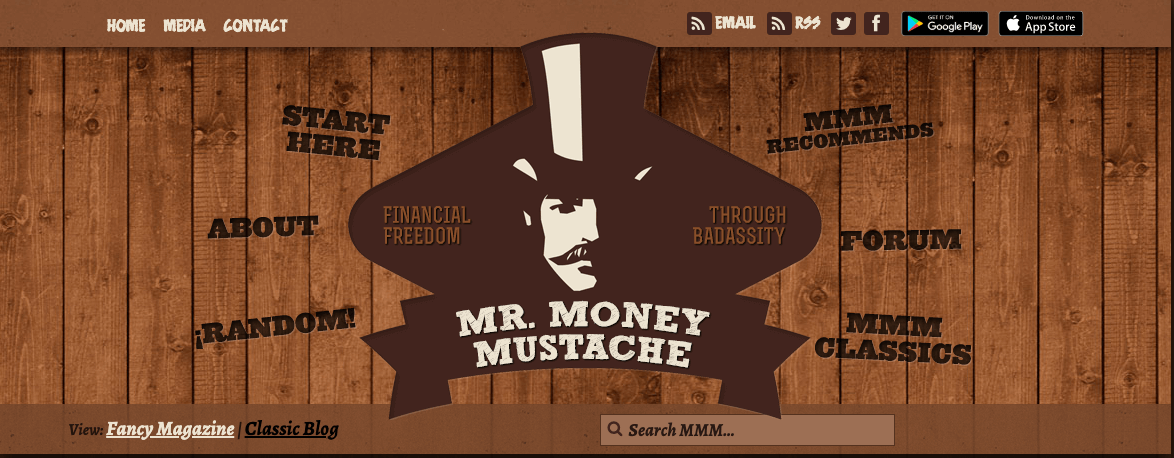
With long, intermittent posts and a strong voice, this blog covers some similar ground to other personal finance blogs, but with a core philosophy and explicit style that’s weaved in throughout absolutely everything on the site. This blogger made a very pointed decision when it came to his decision on how to pick a blog niche within the crowded personal finance space—one that’s created a lasting brand for him to reap the rewards from for years to come.
Example #7. Copyblogger (Blog Niche: Copywriting)
Copyblogger’s focus has always been on online copywriting, with mostly short, focused posts aimed at an audience of bright copywriters and marketers.

With a reputation for quality, plus a growing suite of products, Copyblogger has carved out a great niche within the “writing about writing” world, and I’ve even learned a thing or two from them over the years when it comes to crafting an effective blogger outreach campaign.
Example #8. Zen Habits (Blog Niche: Personal Development)
Leo Babauta’s simple yet elegant Zen Habits blog, has been going strong for more than a decade.
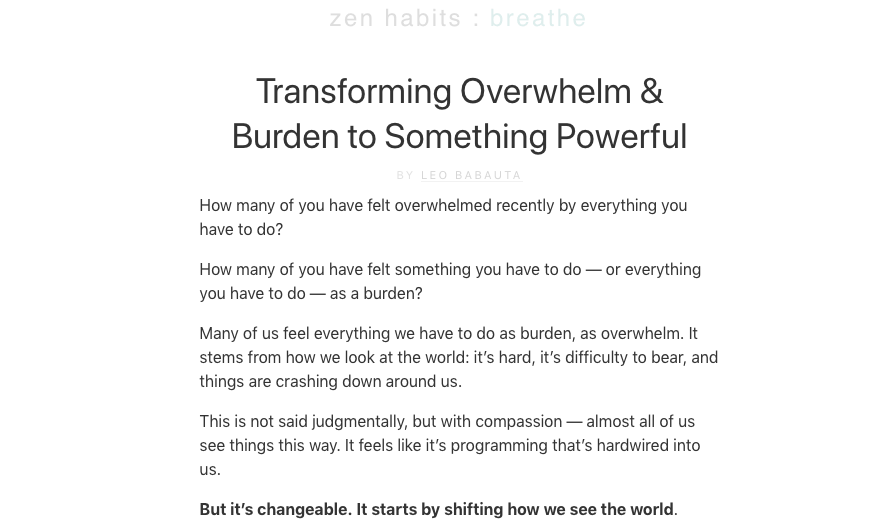
With a clear, uncluttered, ad-free site, Leo’s approach to blogging, as well as his focus on the intersection of mindfulness and personal development, has won him many engaged fans.
Example #9. The 4-Hour Work Week (Blog Niche: Internet Entrepreneurs)
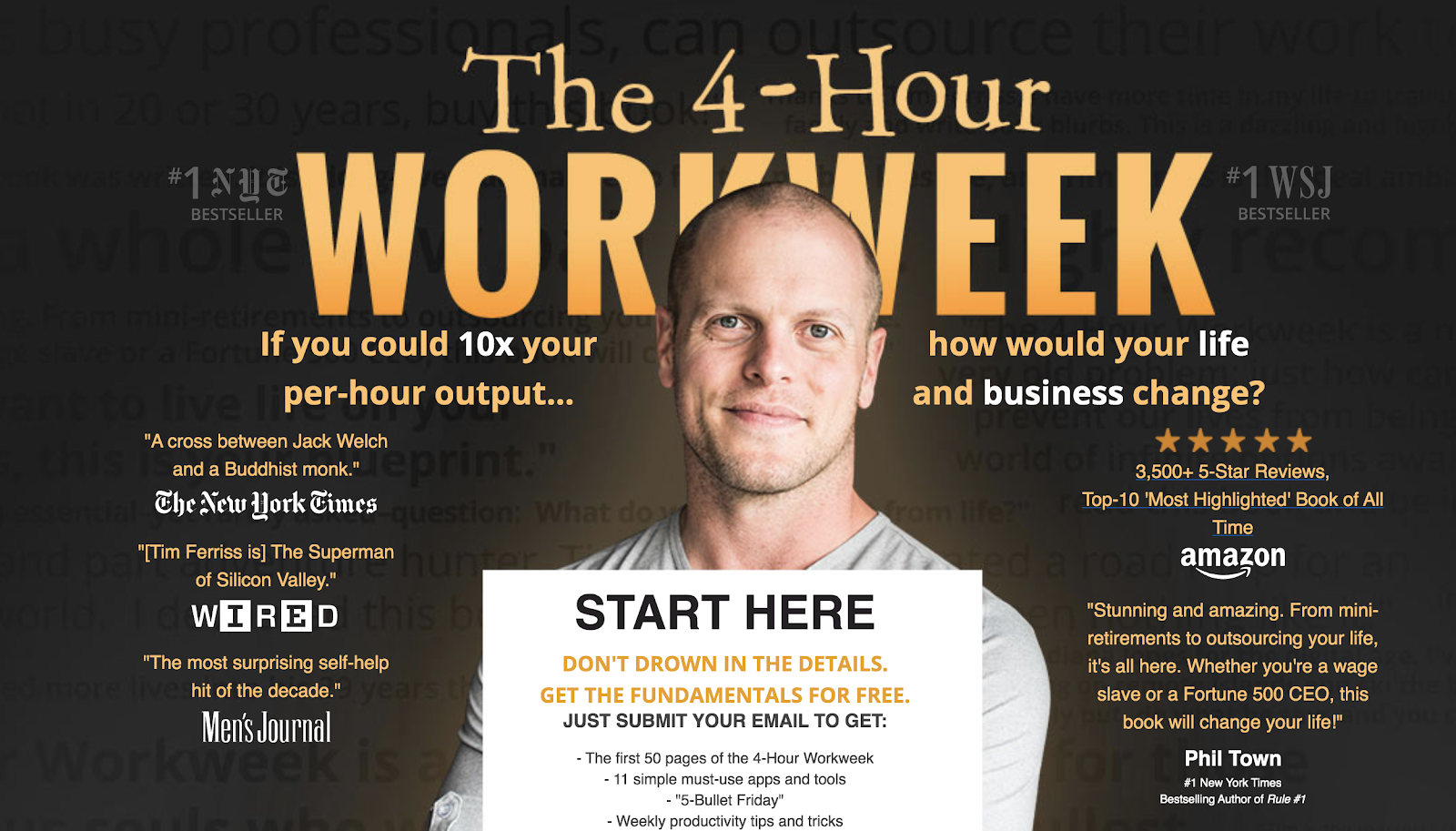
Tim Ferris is the creator of the 4-Hour Work Week blog. His blog niche focuses on ways to efficiently and successfully run an online business. Some of his posts include information about streamlining work, outsourcing jobs, and developing time management skills. He teaches entrepreneurs how to drastically lower the amount of work they pour into their businesses and give them more time to work on the things they want to such as creativity or innovation.
He released a book called The 4-Hour Workweek in 2007 and it covered many of the same topics as his blog niche. This book quickly became a No.1 bestseller and helped cement his popularity in the blogging world.
Tim Ferris’ blog includes articles and podcasts covering a range of blog topics. Much of his content features successful bloggers, entrepreneurs and other famous people. One of his most popular podcast episodes includes Bob Iger, CEO, and Chairman of Disney, which in part inspired me to eventually start a podcast of my own a few years ago. If you’re interested in podcasting, be sure to check out my picks for the top podcast hosting providers on the market today.
Example #10: Notes From the Road (Blog Niche: World Travel)
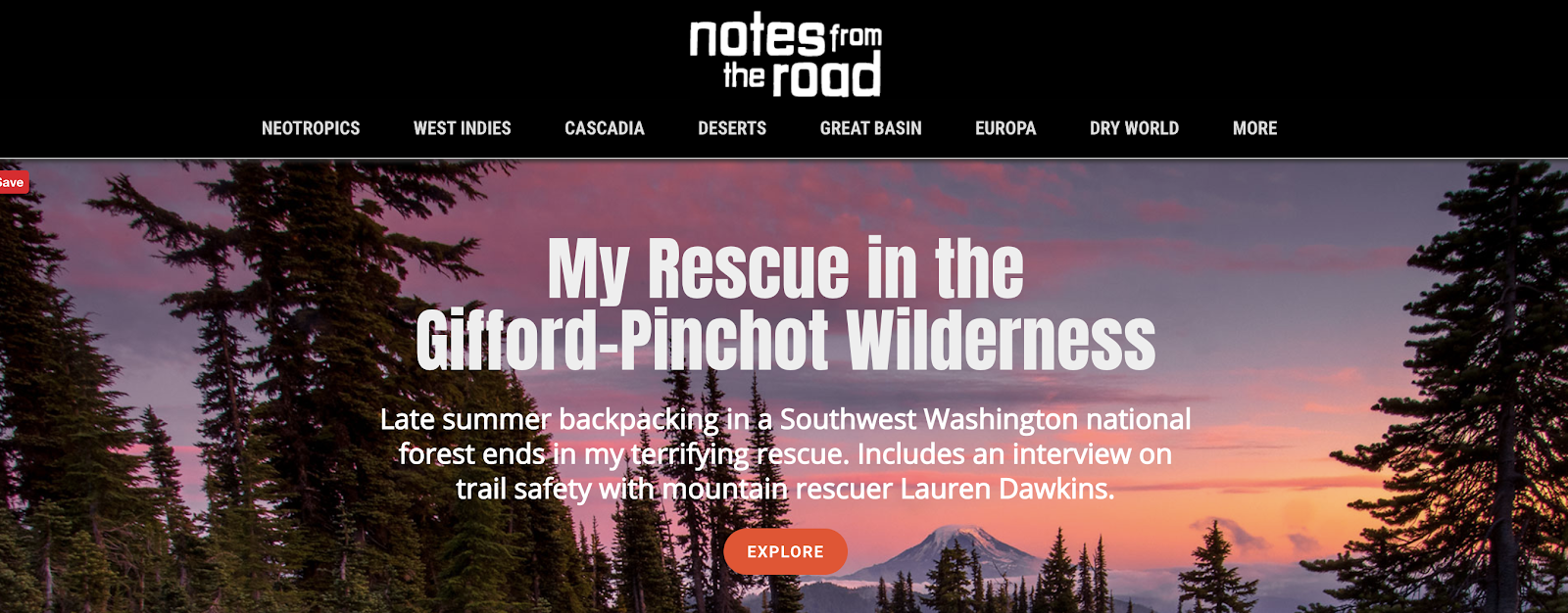
Travel blogging is a very popular blog niche, largely because of how many people love traveling—and the fact that there are a lot of different ways to monetize a site in this niche. Erik Gauger, creator of the blog, Notes From the Road, uses his love of travel and photography to deliver an entertaining and interesting insight into his world travels.
Many of his travels include adventure elements such as backpacking in the wilderness, but he also writes about time spent in various global cities.
Written from the perspective of an “average guy” Erik Gauger says, “By road, by kayak, by seaplane and most of all on foot, I tackle the themes of city and country in the modern world. Travel writing sometimes gets a bad rap, because of ‘The azure sea was undulating and the hotel was fabulous.’ But travel writing can be funny, powerful and personal.”
Erik Gauger acknowledges that modern-day travel blogging sometimes has a bad reputation because travelers are incentivized to leave glowing reviews of hotels or travel destinations. His long-lasting position within this blog niche is more about sharing the personal experiences of traveling than dropping a five-star review of a resort.
His blog also includes original sketches, animal and plant life lists from around the world and music lists for travel. He should consider a career in pet blogging!
Example #11 With the Grains (Blog Niche: Food and Recipe Blog)
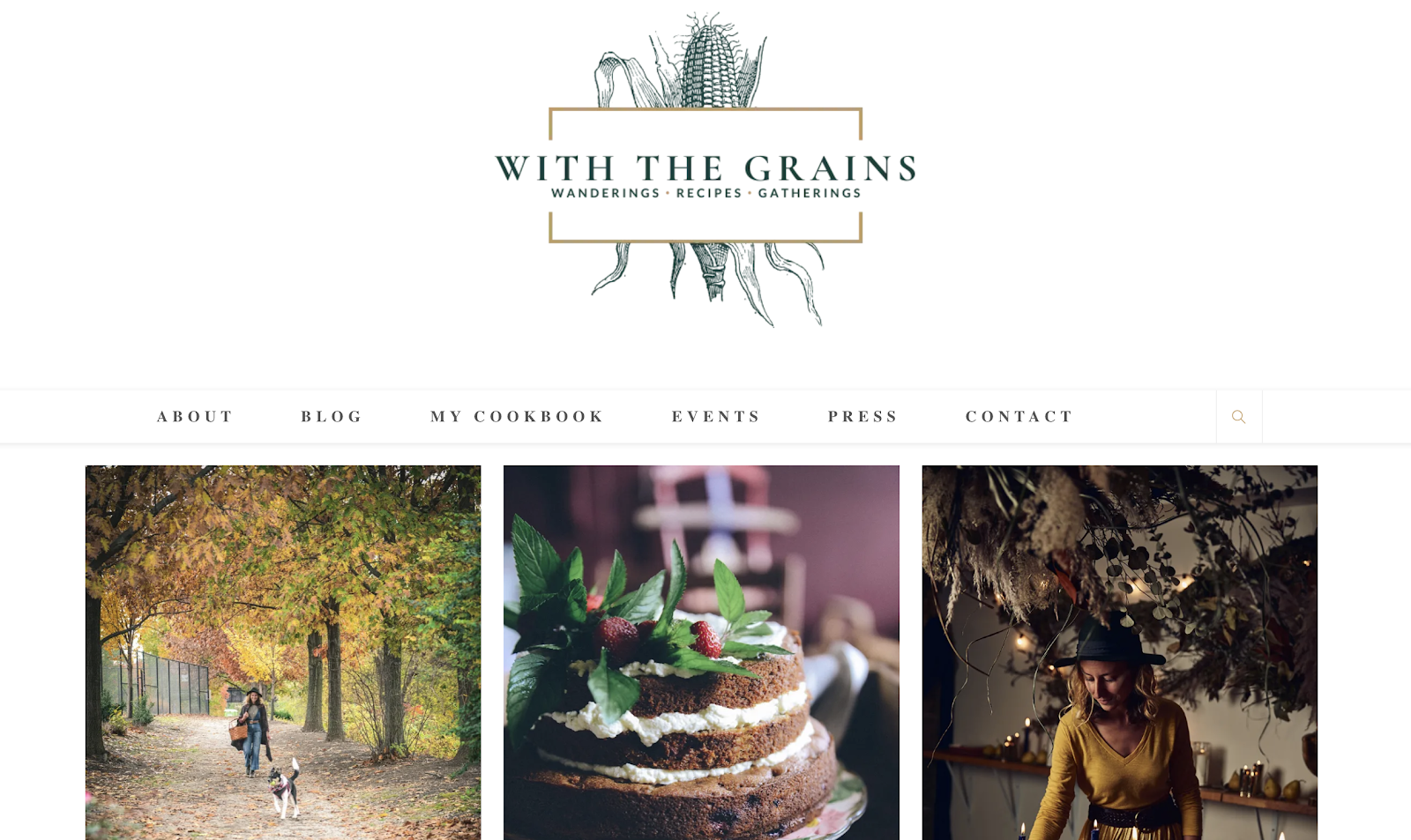
Food and recipe blogs are one of the top niches that dominate social media sites like Pinterest. Favorite recipes are shared among friends and cooked at home. Food blogs fill a real need in people’s lives because we all have to eat—whether you’re sharing recipes and meal prep ideas, or teaching cooking skills to newbie chefs.
So what makes a recipe blog stand out among the plethora of food blogs available? In the case of the blog With the Grains, it comes in personal storytelling, warm vibrant photography, and unique recipes.
Quelcy Kogel, the creator of With the Grains, decided to pick a blog niche that was very close to home for her—including recipes for people with a wide range of tastes and cravings. For those with allergy sensitivities, she has gluten and dairy-free recipes. Most recently she published a book called The Gluten-Free Cookbook with over 75 gluten-free recipes. Quelcy’s unique take on this blog niche include a combination of recipes, travels that include food, table design ideas for gatherings and more.
Bonus: If you’re interested in food blogging for your niche, then check out some of my own advice about starting a food blog and you can even observe my own real-world approach to food blogging with my girlfriend’s vegan food blog, Vegan Anj.
Example #12 Young House Love (Blog Niche: DIY, Home Improvement, Interior Design)
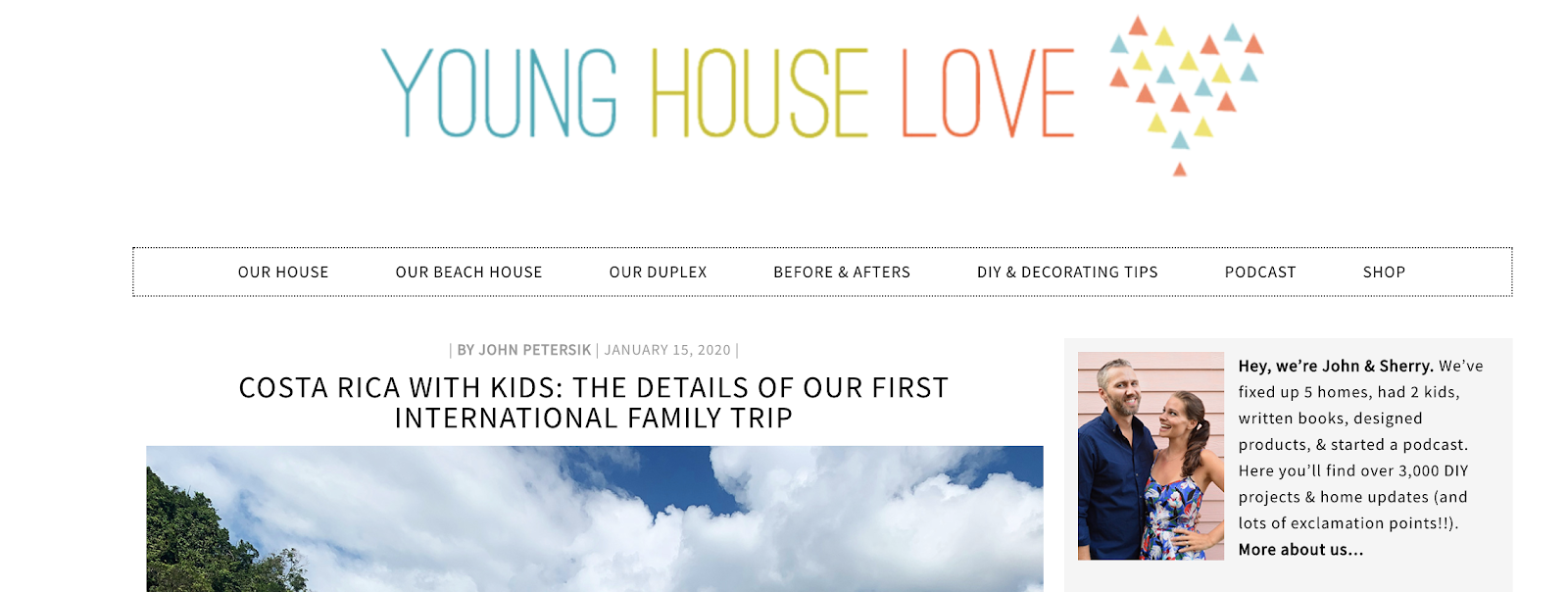
Young House Love is a home improvement blog that has garnered a lot of success since it launched into this blog niche back in 2007. Husband and wife team John and Sherry Petersik are down to earth and have a gift for design and reconstruction.
On their blog, they cover topics like DIY projects, house renovations, interior design, flipping houses and more. They not only run a successful blog, but also a highly popular podcast.
They’ve published several books and have gone on to design products for Target, Home Depot and Wayfair—all because they decided to pick a blog niche that tapped into their own deep personal interests & experiences.
Their blog posts and podcasts are very relatable and make their audience feel like their projects are doable. They give very detailed plans and pricing for their projects while also weaving in stories from their personal lives. They also give pretty awesome before and after pictures for the “wow” factor. Pictures like that do very well on social media and are easily shareable.
Example #13 FarmHouse on the Boone (Blog Niche: Wholesome/Natural Living)
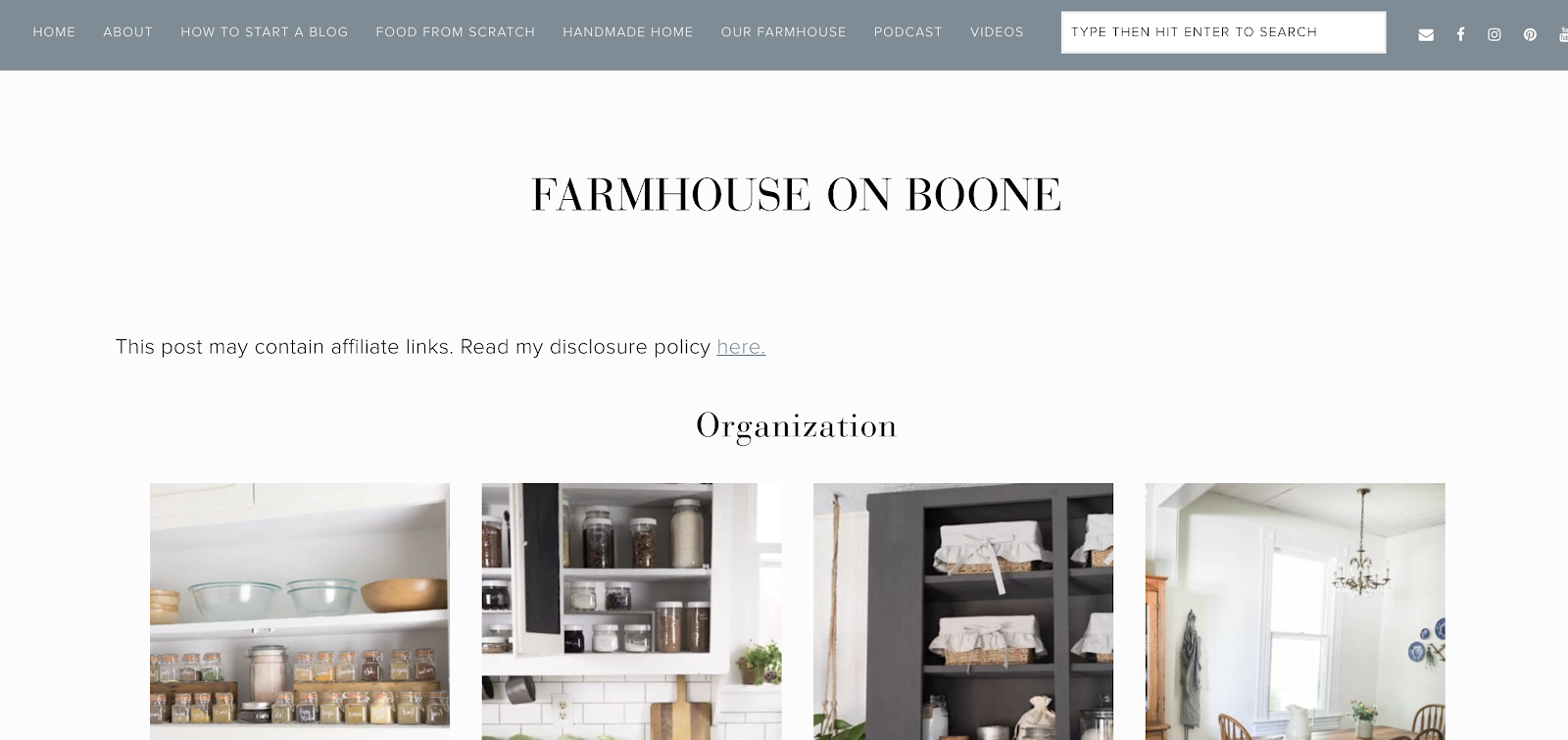
Farmhouse on the Boone is part of a growing blog niche today (lifestyle blog meets food blog)—showing the advantages of slowing down, making food from scratch and enjoying the process of creating by hand. On the blog, creator Lisa shows the transformation of their 1890s farmhouse and shares recipes and handmade projects.
Other things covered in this blog are things related to natural living, parenting, organization, beauty products, interior design and more. Even their blog layout makes their design aesthetic very clear, and they cover the details of everyday life from a wholesome and intentional-living perspective.
Farmhouse on the Boone has a really strong social media following with almost 100,000 Instagram followers, over 200,000 Facebook followers and over 3.9 million monthly viewers on Pinterest, illustrating that Lisa picked a niche to blog about very popular topics.
This blog niche lends very well to social media because it’s very visual and people can see everyday snippets from a much bigger story (like what I’m seeking to do with my new food blog project, VeganTable). It’s a good way to introduce people to this lifestyle and show the benefits of it through images. Once people are intrigued, they’re likely to click through to learn more.
Example #14 A Mighty Girl (Blog Niche: Female Empowerment)
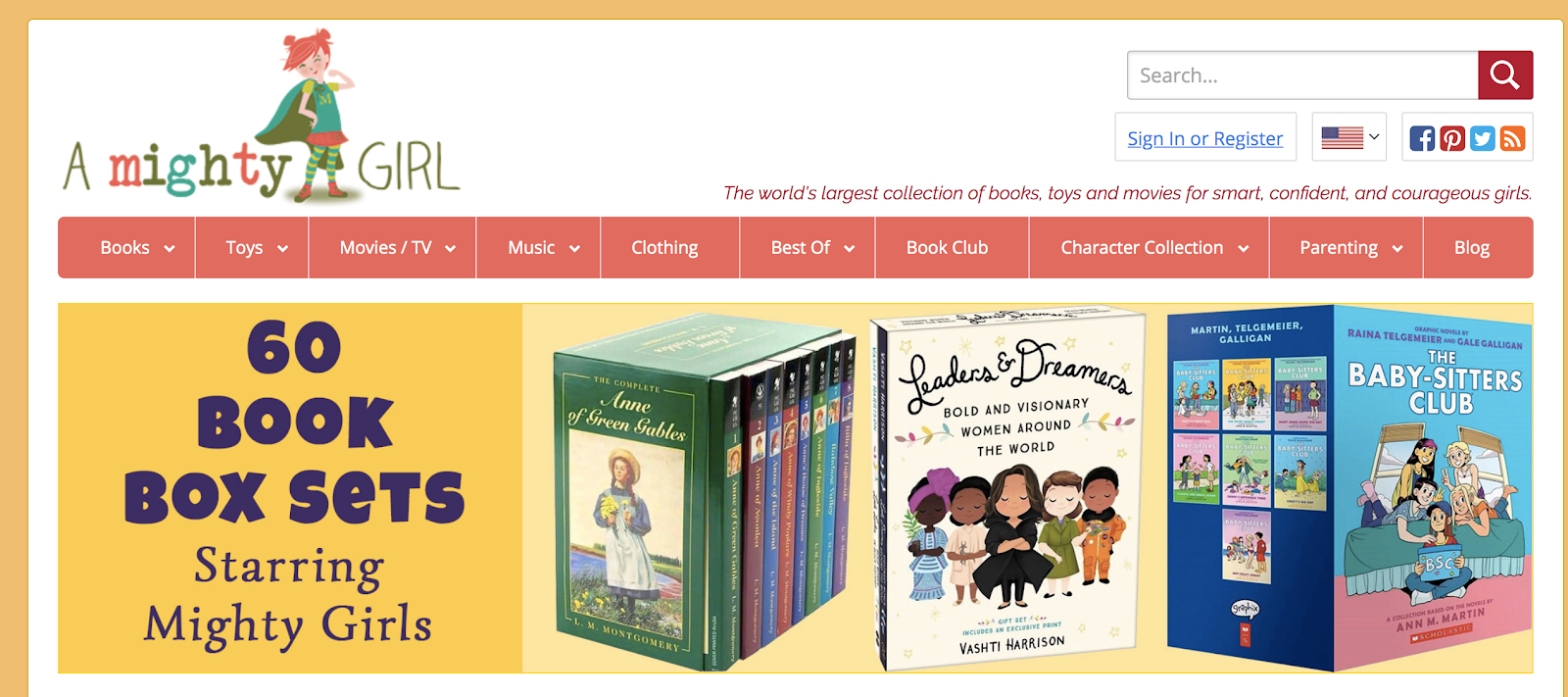
A Mighty Girl was launched in 2012 by co-founders Carolyn Danckaert and Aaron Smith. Their blog is a great resource for books, music, movies and toys that empower girls. The idea for their blog came from a personal interest—they wanted to find books for their nieces that broke the stereotypical mold for little girls. This led them down the path to pick a blog niche that wasn’t necessarily proven out already.
However, they soon realized that this was something that many people wanted for their daughters, granddaughters, nieces, and young women in their life. That’s what inspired them to create A Mighty Girl.
Today, the blog covers many topics like women astronauts, ways to grow girls’ confidence, important women in history, books for many occasions, STEM and so much more.
Example #15 Thrift Diving (Blog Niche: Thrift and DIY)
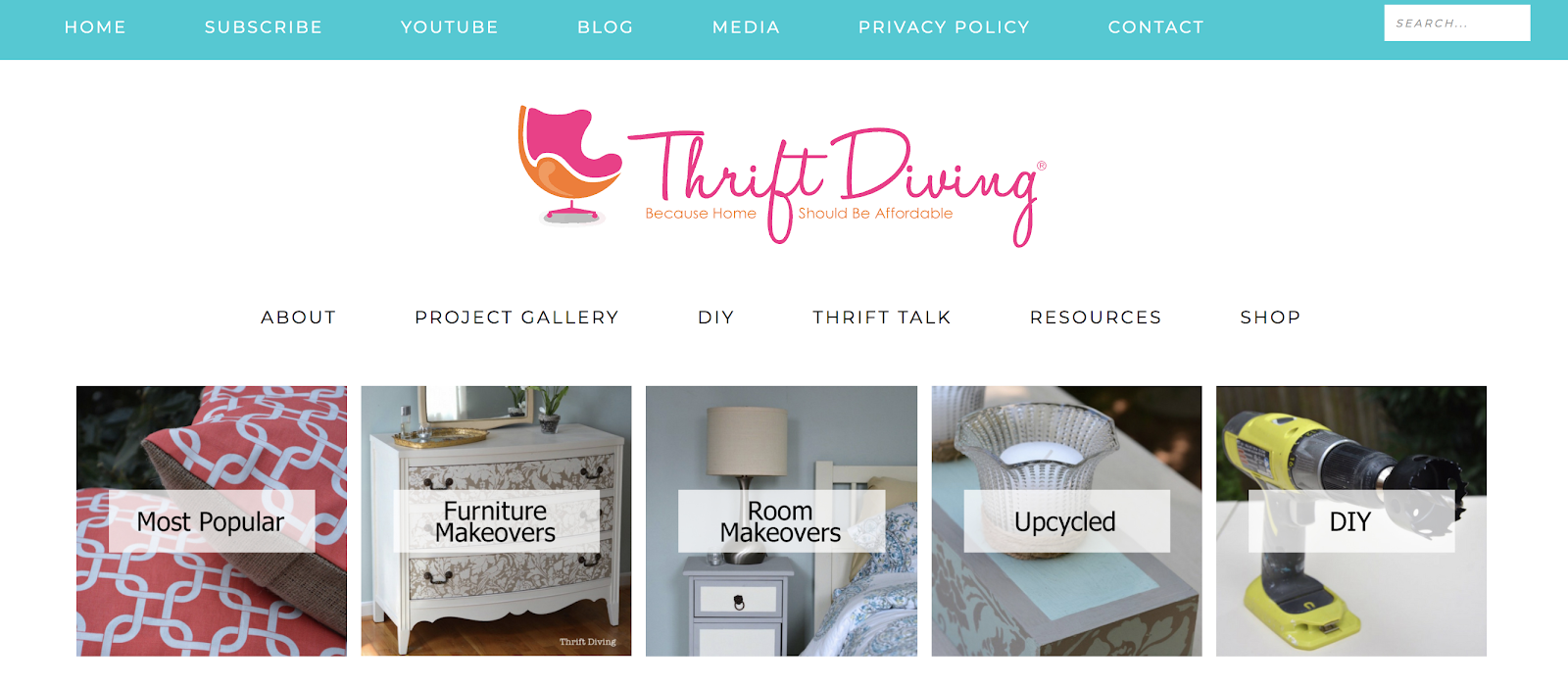
Thrift Diving is a blog about turning thrift finds into treasures. Blogger Serena Appiah (rhymes with IKEA), decided to pick a niche to blog about where she could teach people how to take inexpensive thrift finds and transform them into something useful and beautiful. She includes easy hacks, furniture makeovers, repurposing and loads of DIY projects.
This blog niche appeals to a group of people who are good at DIY and design, but want to do it on a dime. It’s also good for people interested in creating an income from thrift flips too.
Example #16 The Accidental Icon (Blog Niche: Fashion)

The fashion blogging niche has been popular for quite a long time. Today there are many excellent examples of fashion blogs covering unique styles (and many other great blog examples I showcase too). What makes Accidental Icon stand out is it’s a fashion blog created by a woman over the age of 60.
While many fashion blogs are run by younger men and women, this blog shows that interesting and attractive fashion isn’t for one particular age. Blog creator Lyn Slater decided to pick a blog niche where she could show off her travel, style and thoughts on life from the perspective of an academic who’s experienced a lot over the decades.
Although she’s over 60 years old, her blog intentionally does not serve a single age demographic. Instead, she hopes to appeal to thoughtful women of different ages and backgrounds.
Example #17 Side Hustle Nation (Blog Niche: Side Hustles)
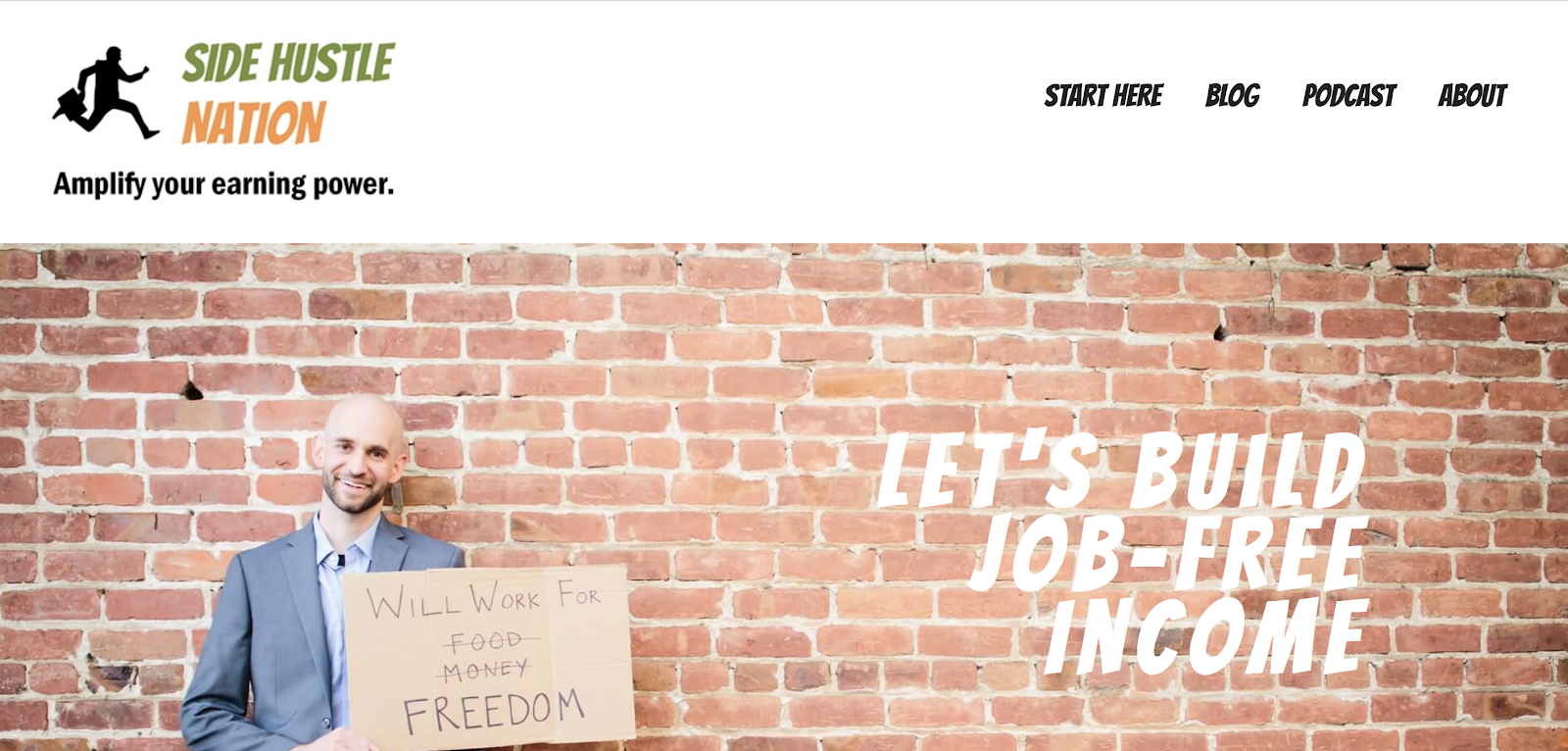
As you already know, side hustles are on the rise. People are finding that side jobs and stumbling upon the right business ideas that can be built outside of your full-time job can be extremely lucrative and rewarding. Some people eventually turn their side hustles into full-time businesses.
Side Hustle Nation is one of my favorites sites in this blog niche, with one of the more clever domain names too. Created by entrepreneur Nick Loper, he decided to very intentionally pick a blog niche where he could share the lessons learned from his own successes (and failures) with side projects over the years.
Nick used to work a full-time job at a large company, and used his off time to start his own business. His site now covers a wide range of blog topics from side hustle ideas to investment opportunities, how to be successful with a side business and much more.
Example #18 Nerd Fitness (Blog Niche: Fitness)
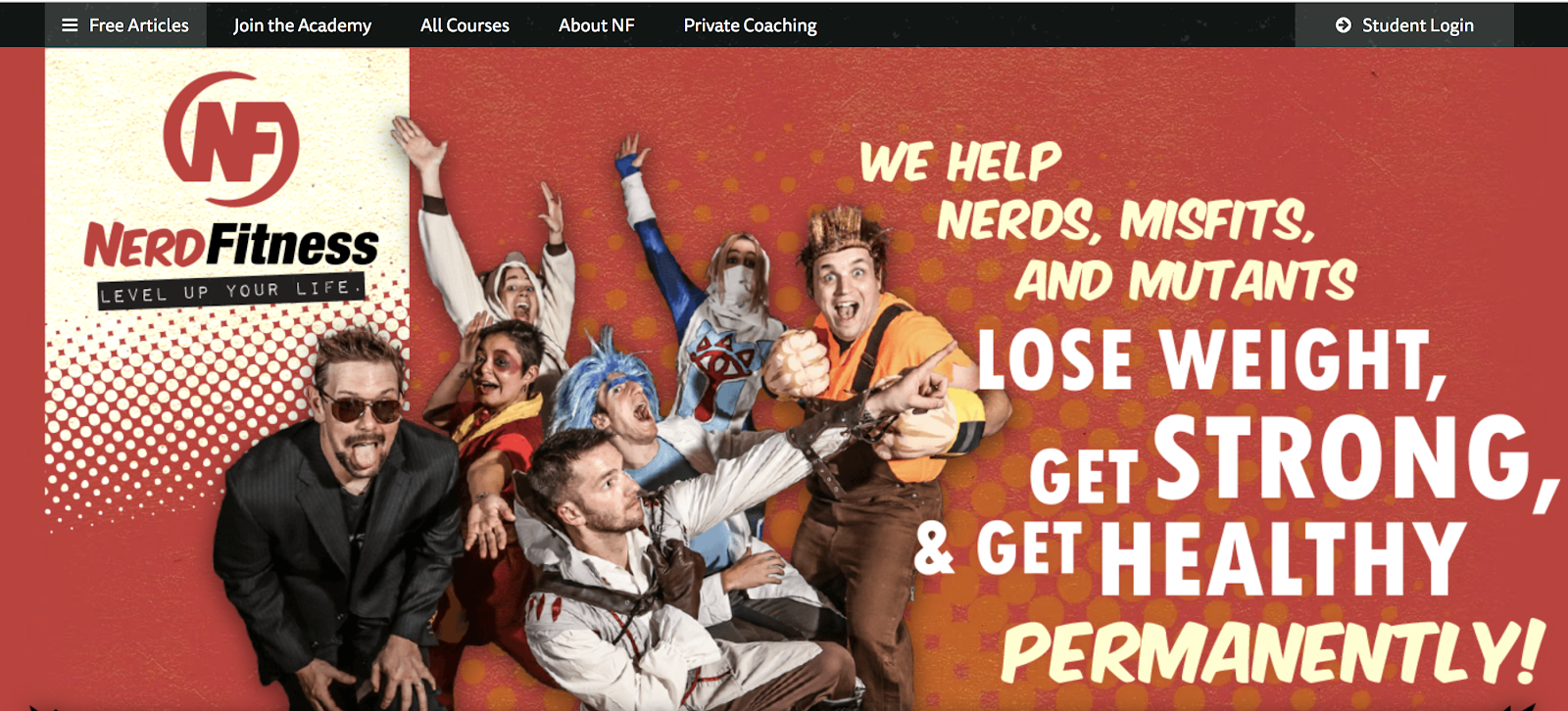
Who doesn’t want to be a little more fit and healthy? Fitness is a highly popular blog niche because it fills a need that many people have. So the question is—how do you take a saturated blog niche like fitness and still grow an audience of your own?
One way to do this is by tackling it for a new or different audience. That’s where Nerd Fitness comes in.
Nerd Fitness was started in 2009 but self-proclaimed nerd, Steve Kamb. He decided to pick a blog niche where he could market to other people like himself, about a topic that was important to him (fitness). He describes his readers as, “people with desk jobs that love nerd culture, games, books and movies, but also know they need to make healthier choices in their day to day lives.”
How does he operate his niche blog differently? For one thing, he wants to make fitness fun for people. According to Steve Kamb, if running on a treadmill doesn’t sound like fun to you, there are a lot of other options like yoga, ultimate frisbee, or karate that might make getting in shape more enjoyable than your average quad workout routines.
Using references from Lord of the Rings and Marvel are some other ways that he makes his content relatable to his audience. There’s even a free “create your character” course that allows you to choose a class, customize a profile and complete “quests” that help you become a more healthy person.
Example #19 Fatherly (Niche: Parenting Blog for Dads)
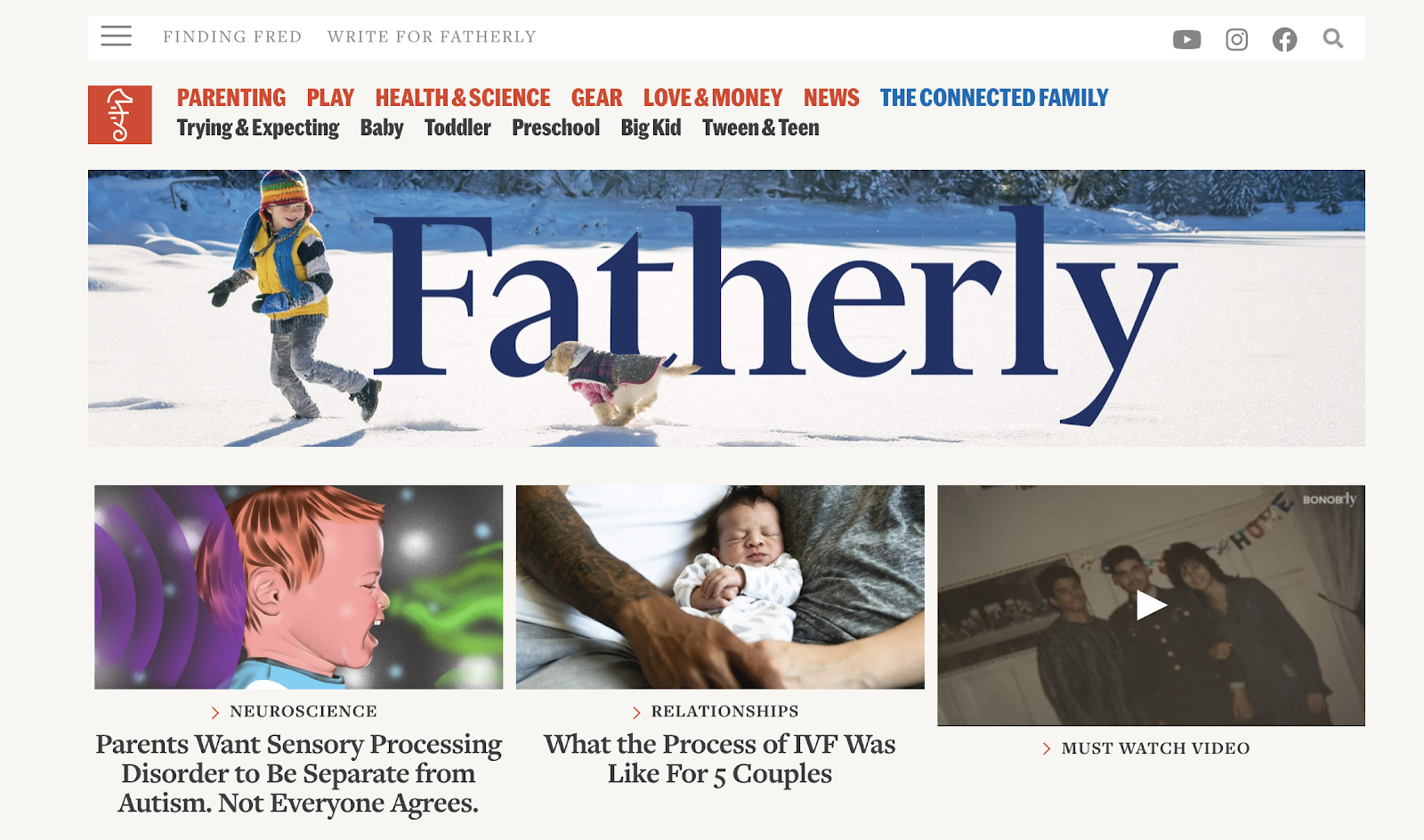
Parenting blogs are common on the Internet, but many of them are geared towards moms. That’s what gives a blog like Fatherly a place in the parenting blog niche world.
Mike Rothman, who previously worked on the blog Thrillist, and cofounder Simon Issacs, wanted to pick a blog niche where they could bring their desire to build a parenting blog that focused primarily on new fathers, to life.
In an interview with Business Insider, Rothman said, “There’s been an interesting shift, where fathers are more involved in terms of time commitment and purchasing decisions. But there was a complete dearth of content for this up-and-coming demographic.”
Rotham and Issacs saw an opportunity for a blog niche that wasn’t readily obvious—yet ended up filling a need many people hadn’t seen at the time.
Example #20 Learn to Code With Me (Niche: Coding)
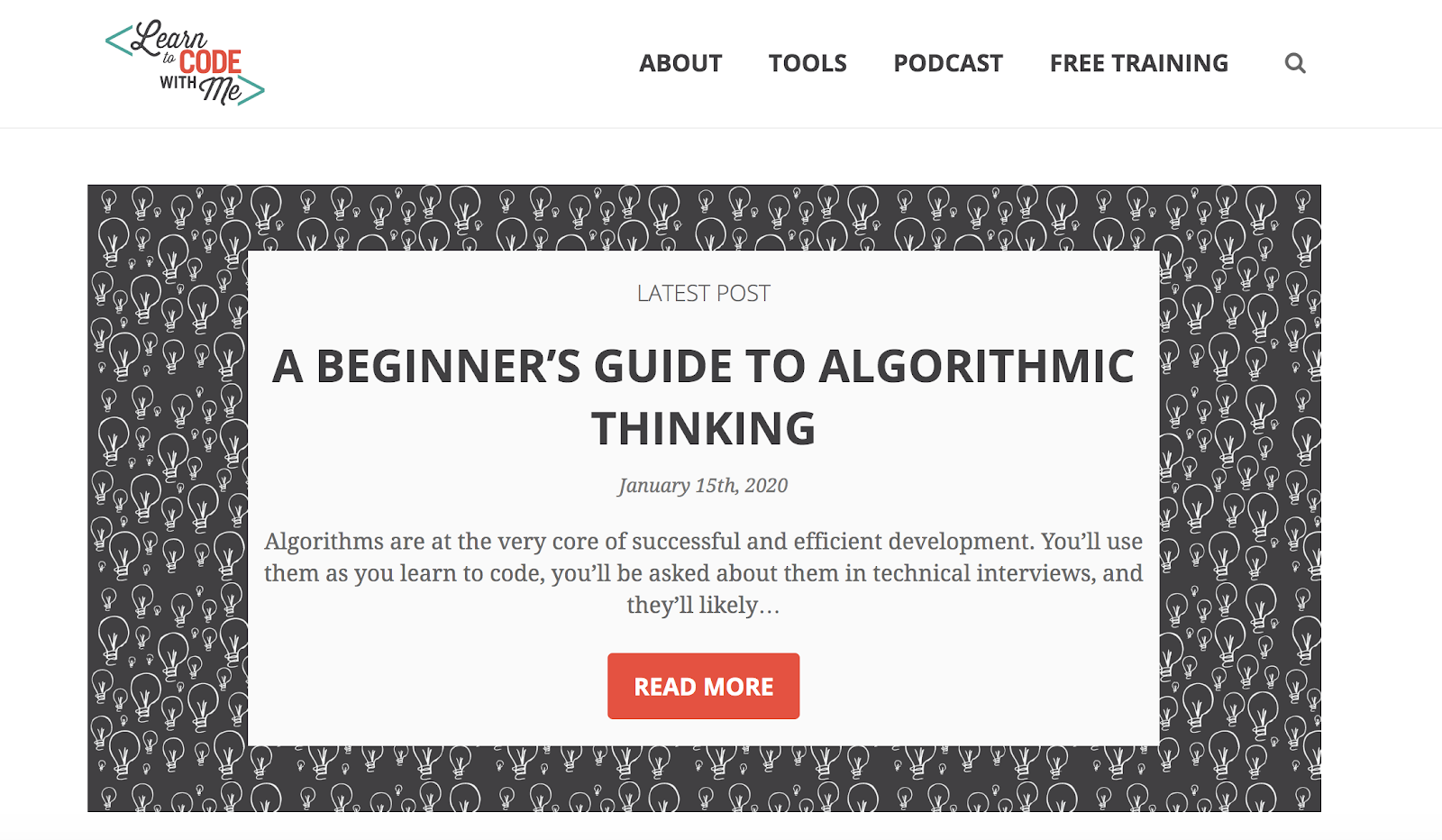
The job market is changing in the world—many jobs (like blogging jobs) are being shifted towards needing technical skill, and it’s predicted that many jobs will be lost to AI in the future. However, many jobs will also be created in the tech industry. In reality, there’s a talent gap in tech, meaning that companies are actively recruiting and training people in this industry. That’s what makes Learn to Code With Me so valuable in this increasingly important blog niche.
Creator Laurence Bradford decided to pick a blog niche that first chronicles her own experiences learning how to code. She’s a self-taught developer who wanted to make a place for people to affordably access education for coding. She writes, “Ultimately, I started Learn to Code With Me to help other beginners start out strong, because I’ve been in your shoes. I’ll show you what to learn and how to use those skills to make your life better, like they’ve done for mine.”
Example #21 Tree Hugger (Niche: Sustainability)
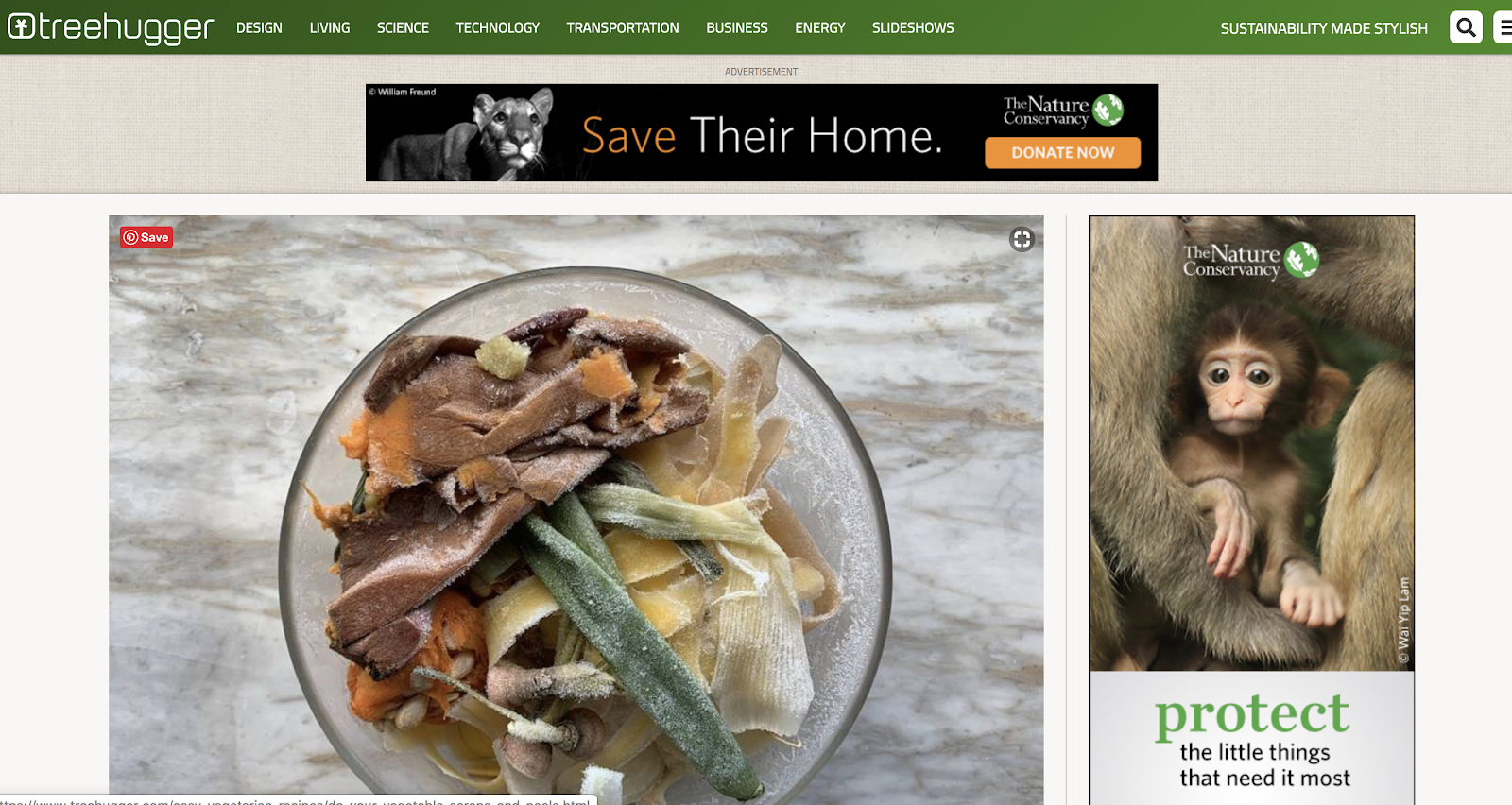
If you’re concerned about the planet or if you spend a lot of your day thinking about ways to help the environment, you may be interested in creating a blog in the sustainability blog niche.
Treehugger is one of the leading blogs for new about sustainability. With over 3 million visitors a month, it’s obvious there’s a real interest in this blog niche. Treehugger covers blog topics like eco-friendly technology, how to run a sustainable business, worldwide coverage of wildlife, personal sustainability and a whole lot more.
This blog is a multi-author site with a thriving flow of content, newsletters and regularly updated social media posts.
Example #22 The Adventure Junkies (Niche: Outdoor Adventure)
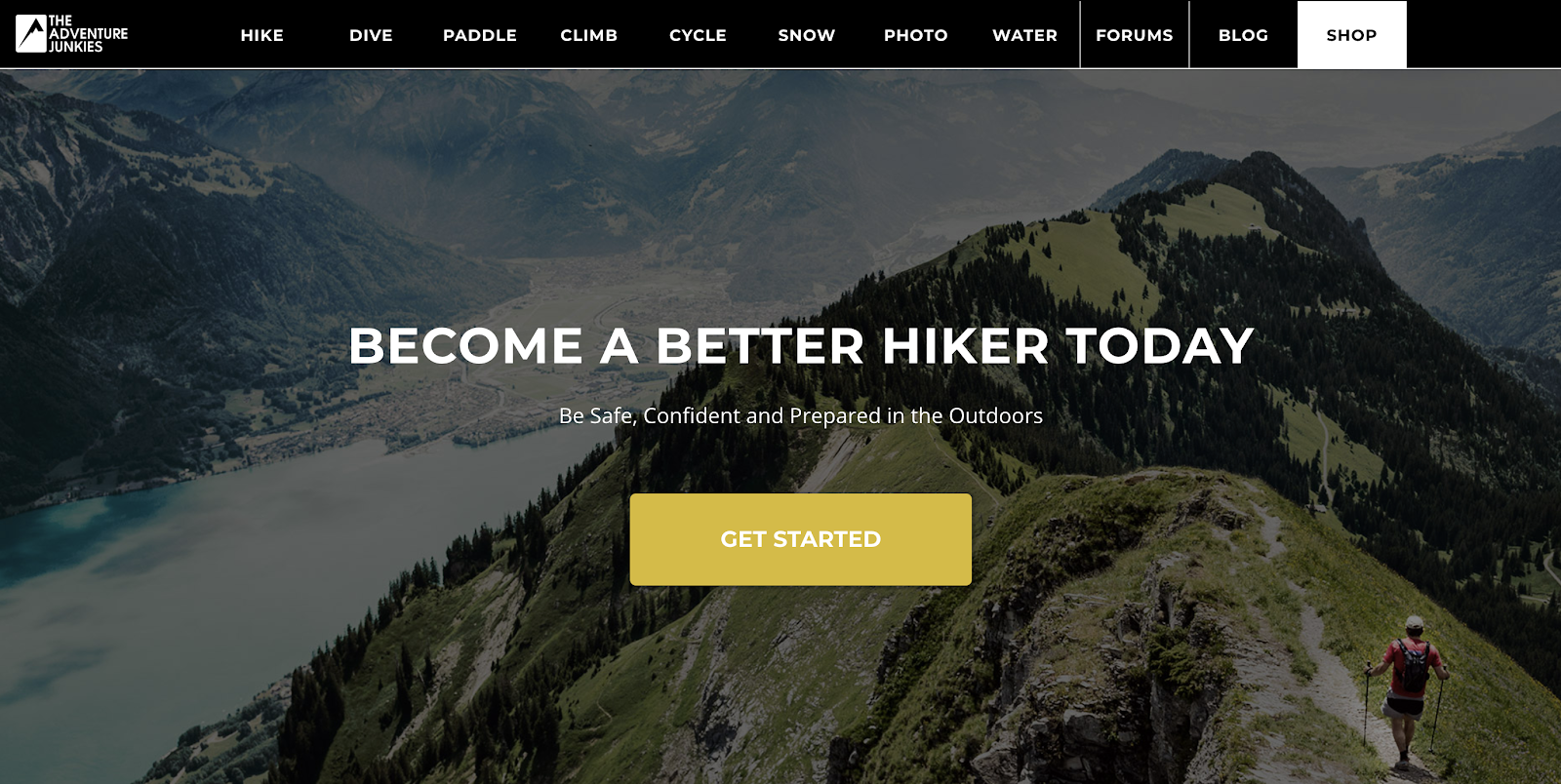
Outdoor adventure is a growing blog niche and there are a lot of enthusiasts who use the Internet to learn about destinations, gear and pro tips.
The Adventure Junkies is primarily an affiliate marketing blog that’s a resource for people interested in all kinds of outdoor adventure. They cover a wide range of topics including hiking, scuba diving, kayaking, climbing, mountain biking, snowboarding and skiing and quite a few more. Side note: I recently launched my own hiking blog over at Hike with Ryan, including my roundup of the best hiking boots today, a list of gift ideas for hikers, my guide about the best hikes in Yosemite National Park and a breakdown of the best months to visit Yosemite during the year.
The Adventure Junkies team explains why they picked a blog niche in the travel blogging space like so: “To help people become adventure junkies, we created this website to be THE place to go to learn about outdoor activities and connect with a global network of like-minded people… Whether you dream of hiking through a pristine forest or exploring the depths of the ocean, we’re here to help make it possible.”
Example #23 Lia Griffith: Craft Your Life (Niche: Lifestyle/Crafting)
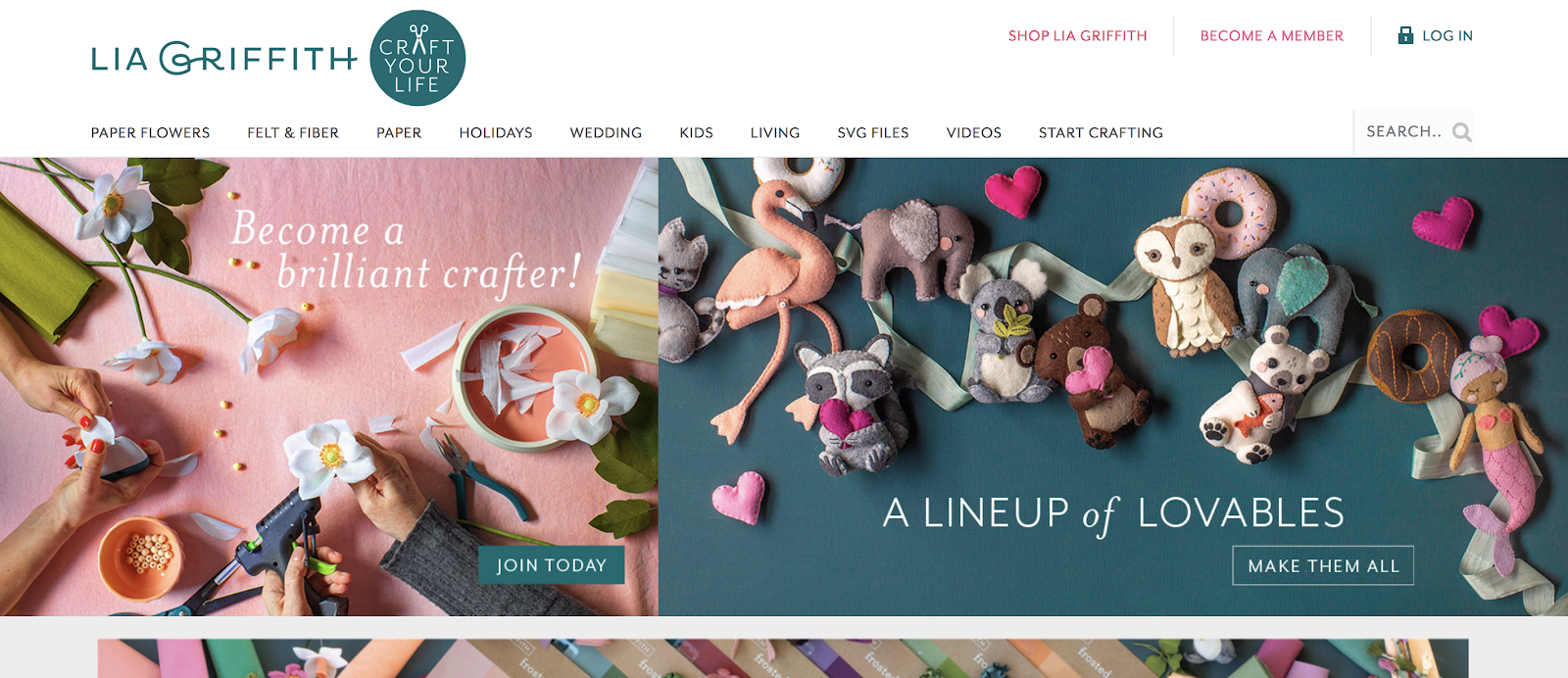
Worldwide, there’s a growing interest in making things by hand. This interest is often called the “maker movement” and it offers bloggers many different blog niche opportunities within that greater industry. Woodworking blogs have become extremely popular as well as sewing, crocheting, painting, jewelry making and many others.
Blogger Lia Griffith wanted to pick a blog niche where she could show her crafting style to her audience. Her focus is on paper-making and sewing and she has made many tutorials showing her audience how to make what she makes. Now she has a team of crafting developers that create DIY templates, SVG cut files, and tutorials for crafters.
Besides offering thousands of DIY content for makers, this blog also has excellent photography. Lia Griffith’s imagery makes it easy to share on social media and other online outlets. Even non-crafting people may be intrigued enough by the photography to click over and see the handmade creations.
How Will You Pick the Best Blog Niche Today?
Every blogger eventually needs to pick a blog niche… and it’s important not to simply pick a niche at random (or even because you think it’s going to make you a lot of money).
If you want to build a successful business and drive real traffic to your blog, you’ll need a profitable blog niche idea that you’re happy to stick with for a long time to come.
Here’s your 3-step blog niche checklist to hit the ground running with. Make sure that you:
- Brainstorm plenty of blog niche ideas before you get too attached to one. Don’t assume that your first idea is your best! There might be a better possibility that you haven’t even thought of yet.
- Run through the list of niche tests in this guide to make sure your chosen blog niche is likely to have a good chance of success. If you discover that it’s not going to be a good one for making money from your blog, it’s time to rethink your choice of blog niche (if you plan to eventually monetize your blog).
- Validate your blog niche before you commit to it. Come up with ideas, write guest posts, start a Facebook page and finally—publish a few articles on your blog to see how early readers react before you go all in on investing in this particular blog niche. Don’t make the blogging mistake of investing a ton of financial resources into your site before you’ve proven it has legs.
Do this, and you’ll be setting yourself up for success right from the start with your blog.
You’ll not only avoid potentially throwing away lots of time, energy and even money into a blog niche that’s never going to work—but you’ll also learn a great deal about what readers truly care about in the niche you choose to blog on.
If you’re ready to test out your blog niche and get moving, then head over to my ultimate guide to starting a blog.
Want to Start Your Blog (the Right Way)?
Check out my ultimate guide How to Start a Blog (on the Side).


228 replies to “How to Pick a Blog Niche in 2023 (+60 Profitable Blog Niche Ideas)”
Very nice positioning for starting a niche blog. So I am Interested in Tech blogging such as mobile tips and tricks, mobile apps but I have a problem, here is a very high competition. Recently I started a new tech blog but my traffic is very low. What I do now?
Thanks for the kind words, Naeem!
Great question too. In a high competition blog niche (like mobile apps), I think you’re going to have to be comfortable with the fact that *if* you truly want to compete on those hyper-competitive keyword phrases, you’ll need to buckle in for a long journey. I’d focus all of my efforts on promoting just one (may two) long-form articles/pages on your blog in order to stand a chance at ranking one of those articles within the next 6-12 months.
Another approach you could take would be narrowing your niche to focus on less competitive keywords (though with lower search volume)… but in doing so, you’ll likely be able to build up traffic quicker than if you’re aiming only for super competitive search terms. The traffic won’t be as much at first, but as you publish more content, it’ll build up steadily. All the while, your blog will also be growing in domain authority—which will steadily make it easier to rank for more competitive terms too. That’s been my journey 🙂
fantastic advice Ryan 🙂
Hi Ryan!
From all the ‘How to start a new blog’ blogs I have read, this one truly contains informative text, thank you so much for that. I would like yo know your thoughts on event blogging. Coming from India, we people are full of events, festivals, Days’ every now and then. What do you think this niche stands a chance?
About competition..! In India event blogging has moderate to high competition for almost all the major events.
Cheers!
I really appreciate the kind words, Sanchit!
Event blogging can be good niche for most major markets, depending upon how you approach the actual content you’re publishing about these events… as you said yourself, there’s a lot of competition, right? How can you make your content stand out from the crowd in this space?
Niche blogs can be great, I love the idea of going really deep into a topic and providing a ton of value. However I always recommend beginners choose a wider vertical and then focus on a particular topic/angle and go deep at first and then go wide to other related topics.
What do you think Ryan, how niche do you think people should go with the first blog they start?
I (usually) recommend the opposite approach! That’s based on my own experience though, and plenty of examples could support either approach in full transparency.
Here’s my rationale though. By focusing on a more narrow niche… taking my example of ranking my first truly successful article originally for the keyword phrase “side business ideas” is what started to build my traffic in a meaningful way. And by focusing both that pillar post & many of my other articles at the time specifically around the side business/side hustle niche, I was able to eventually grow my reach on that pillar article up to competing in the top spot for searches of “business ideas” over time as my blog grew in authority.
That authority also led me to a place where I could *then* more easily compete on related topics like making money online, starting a side business (eventually starting a business) and such. For me, carving out the niche of side hustles was what allowed me to eventually grow into the more broad domain of “business” and now over to the segment I’m focusing the majority of my content on moving forward… blogging 🙂
Sir,
Did a few replies via email but I don’t think you received them sir. I am a very interested in doing a 1 on 1 business consult via phone or webchat if possible. Please email what your price is if possible as I am very interested in hearing some of your ideas as I do not have a “traditional blog” like most writers do.
Brian
Hey Brian! Can you shoot me a new email to [email protected]? Not seeing anything from you in my inbox yet.
Hi Ryan!
I have learned a lot from your article which is full of knowledge and reasoning and this led me to understand where I was wrong.
Actually, I created a blog (wp) sometime back with health and wellness as the niche.
I wrote some articles but there were almost no readers. Now, after reading your article, I think that my blog should be a niche blog with “living with diabetes ” as the niche. I personally have been suffering from diabetes for the last twenty-five years.
Now, can I change my blog niche henceforth as I have some ideas about diabetic management.
I have another issue, I can’t find blog topics to write on. Would you please help me with some ideas.
Thanks and regards,
Kalyan Ghosh
I think that’ll be a much smarter/savvier positioning for your new blog—to go after the living with diabetes niche. Especially because you have so many years of experience living with/managing it and I’m sure lots of insights to be shared with others seeking answers out there too.
Yes! I can definitely help you out with generating some fresh ideas for blog posts to write on your site. Start with this article of mine, which will walk you through 100+ different ideas, prompts and thought experiments that’ll guide you towards creating a list of blog content for you to start writing. Here’s that article: https://www.ryrob.com/blog-post-ideas/
Love this. Picking a niche is smart for everyone who want to succeed in a blog. And if someone wants to start blogging, you can start with free platforms like a WordPress website and start right away.
I completely agree! Picking a niche is a must today, and WordPress is definitely the best, most versatile blogging platform 💪
This helped me a lot in getting the right direction for my blog topics. Thank you.
So awesome to hear that! You’re welcome, Geetika 🙂
One of my FAVORITE blog posts of all times! I wish I had this content before starting many blogs (and businesses).
Thanks a lot Ryan.
Ah you’re too kind! Thanks for the praise and really glad you found this guide so impactful 🙏🏼
Hey Ryan,
Thanks for the great article.
What’s your thoughts on affiliate focused business where niche is not my best of interest but know it’s high potential one for affiliate monetary? Should I still proceed with?
Will there be different focus when it’s come to affiliate blog?
Great question and I’m glad you asked!
My personal recommendation—regardless of how you plan to monetize your blog, it’s not worth blogging in a niche that isn’t an area of interest for you (even if there’s a clear way to generate income from affiliate promotions). Readers will be able to see that your level of interest isn’t as genuine as others, and ultimately you’ll have a very difficult time (1) getting traction in the first place and (2) making a long-lasting business of this blog that you’re not very personally interested in. Plus, it’s going to be a lot of hard work building up a profitable blog… chances are high that your lack of interest will translate into a lower level of commitment to push through the challenges ahead.
If I were you, I’d focus my efforts on determining how to monetize a blog in a niche I care more about 🙂
Love the article Ryan.
I’ve spent what seems like months on end just trying to do everything I learn from other blogs and off YouTube.
My main issue is concerning the saturation in my niche. I picked Home-gyms because it’s what I always found myself looking up and talking about with friends.
I’m not sure on my angle when I look at others in niche I see all my ideas are written by big authority sites with several writers.
Nice! I actually really like this niche as an example of something you could make a serious dent in.
From some quick keyword research (using the free Twinword and paid Ahrefs tools), I can see that “home gym” and “home gym equipment” have a TON of search volume… probably around 100,000 monthly searches when these two core terms are added together, which is great. What’s even better though, is that the competition to rank on the first page of Google search results is actually *not* that steep compared to a lot of other industries/keywords I work with more frequently. Initial research suggests to me that you should be able to rank on the first page if you publish an article of epic length and then do a big guest posting tour to get some natural, high quality backlinks for it—aim for 25 to 50 quality backlinks done through guest posts only (not buying links or other shady methods of trying to speed things up).
Sure, your competition consists of sites like Men’s Health, Dick’s Sporting Goods, Fitness Factory, etc, but you have a MAJOR competitive advantage should you choose to lean into it… write in great depth. Everything ranking on the first page for “home gym equipment” honestly sucks big time from an SEO perspective. The Dick’s Sporting Goods result is a product sort page (not what typically ranks #1 compared to when someone has great ultra long-form content on the subject), the Men’s Health article is a slideshow (LOL), there’s an Amazon product sort page (again, not usually the “best” kind of page to rank high for most Google searches) and so on down the line… this keyword phrase is so ready for a 10,000 word article on something like “101 Best Home Gym Equipment Pieces You Need (to Get Fit) in 2020” that you can truly knock out of the park… and then go around writing guest posts for fitness/nutrition/health blogs and smaller publications to build some links back to that epic article of yours.
That is exactly what I’d start doing right now and expect to see results within a few months of working hard on this campaign 🙂
Its very nice to learn so many things regarding blogs. I will mail you, need your help please so reply.
Sure, ask any questions you’ve got! Either here in the comments or via email is fine 🙂
Hey Ryan,
First and foremost, I love reading your blogs thoroughly and make notes out of it because it is so useful for millions of bloggers who are struggling to get some audience. I have a query. I am starting a blog site named : Progress Mindset. As the name speaks for itself, the blog niche will focus on self improvement and how one percent progress each day leads to a better life in the long run.
Now, creating a Progress Mindset requires 4 dimensional model
Step 1: Reset: Step to reboot memory and develop a connection with the future you.
Step 2: Ritual: How to cut down on bad habits and use domino effect to develop good habits?
Step 3: Refocus: If at all we are distracted, different strategies of coming back to what we are doing.
Ste 4: Recharge: Since Willpower is limited, ways of recharging ourselves to deal with obstacles in the way
Now, I will be creating blogs covering each of these areas.
Ways of monetization:
1. Online Courses ( Topics related to unique habits/ rituals for different kinds of professions, topics on mindful eating, breaking bad habits, how to develop a mission mentality etc..)
2. Consulting services ( One on one consulting service/ Progress mindset workshops for nearby offices )
3. Blogging ( Monetizing the blogs if they are successful )
Now, when I researched the blog niche topic trends in AHREF, I discovered that there is a lot of growth in trends on mindfulness, productivity, meditation, habits, willpower and etc..
Plus, I am passionate about meditation, writing, habit building and self improvement.. so I chose this..
Questions:
1.But, the competition is too high, can you suggest me some ways how to do it differently?
2. I am designing my website with wix.. but is this best way to start or should I start writing on Medium first ( let’s say 5 articles on my topic to test how people are actually interested in reading my topic )
3. How to write a content for a online courses?
4. How is the future trend for audio articles? Do audio articles work better than written blogs? ( I wanted to podcast my written articles into audio )
5. Is it manadatory to open a youtube channel on Progress mindset, if I am self hosting the courses?
6. If you could suggest an article for steps to develop a online course
You’re welcome, Koel! There’s A LOT to unpack here.
It sounds to me like you’ve already done a ton of research, planning and have a clear angle you’re aiming for within this niche (I like it). Monetization plan is well thought out too, just anticipate changes as time moves on and keep an open mind about win-win ways to monetize with your readers as you learn more about who’s consuming your content.
1. Competition will always be high for terms like “how to meditate” or “how to build habits” but you should pursue long-tail keywords that have less competition. More on that here: https://www.ryrob.com/keyword-research/
2. Not personally a fan of Wix. I recommend WordPress to every blogger as a long-term publishing platform, but Medium is an ok starting point to test things out. Just don’t expect to magically get tons of readers through Medium if you don’t already have some followers there… try to get your articles published on a Medium publication where more readers are subscribed.
3. Deal with how you’ll manage your course content creation much later (after you have real readers and are learning from/about them).
4. Don’t launch a podcast at the same time as starting your blog, you’ll dilute your own effectiveness at something you’re trying to make a big impact in. Focus on the blog for now, worry about audio content/a podcast later on down the line (unless you already have an audience of people who listen to your voice on some platform).
5. Nope, no need to start a YouTube Channel yet either—same answer as #4 here. Do it later once you have good reason to.
6. Again, I’d strongly advise not going down this route yet of creating an online course… you should build some traction with your blog first. When you’re ready though, both Podia and Teachable have great guides to developing an online course.
My advice to you is… stay FOCUSED on just one thing for now—getting your blog online, content published and readers coming your way. From there, all other things can come 🙂
What do you think about certain niches (namely health/alternative medicine) that seem to be hit hard by search engine algorithm updates? I am interested in a field called “biohacking” which is basically healthy lifestyle with a goal of optimizing mind, body, and spirit. Subjects include diet, supplementation, nootropics, exercise, sleep, microbiome, meditation, etc.
However, Biohacking seems like the opposite of a niche to me. How do you recommend going about choosing one specific component? Or maybe just write about a few? I have a hard time narrowing down because the whole premise of the field is that no single input is responsible for the (optimized) output.
My rationale is that I can see what I get the most interest in, and what topics I prefer writing on. I’ve seen your thoughts on wide vs narrow so I am curious what you think about choosing several topics instead of one.
Great questions, Nick!
Health/alternative medicine niche—personally, I don’t like this space at all for the reasons that (1) I believe it’s rightfully a topic area that should require a certain level of expertise and credentials beyond just an “I tried this experiment for 30 days and cured my _________” as anecdotal evidence that won’t necessarily be applicable to others and (2) because as you pointed out there’s a lot of volatility in these niches from the search engines… but IMO that related back to point #1 about how hard they’re trying to figure out the best ways to surface content from credentialed medical sources moving forward. I’d expect a lot more volatility there in the years to come too.
Biohacking specifically is an interesting use case. According to Google Trends, that term appears to be on the rise pretty rapidly right now. Not sure if it’s a bubble being fueled by startup culture (my guess), but it could possibly be a good space for creating content in—if you’ve either (1) got some credentials to back up any medical-related recommendations you’re making or (2) lean heavily on legitimate external sources/people/companies who are doing studies and giving medicine-backed advice. I think you could make the case that “biohacking” is actually a pretty perfectly sized niche from a keyword perspective… using Ahrefs, I see about 39,000 monthly searches for the term “biohacking” but I’d wager it’s probably significantly higher than that in reality. That’s a good sign. There’s also a lot of potential (as you’ve identified) to spread out into sub-categories within this overall niche, so I’d say if it’s something you’re really passionate about—then give it a test run with publishing 5-10 articles, working hard to connect with an audience, gather some feedback and use that REAL world feedback on your published content to chart a course for whether or not you should consider niching down further or keeping it higher-level. All the speculation in the world won’t be as helpful as some genuine feedback and data points 🙂
It sounds to me like you’re on the right track though—really looking forward to seeing you take action on this, Nick!
Such a helpful explanation of a niche blog. Thank you.
You’re welcome, Sudhanshu! Good luck with your own niche blog 🙂
Hey ryan, i’m an 18 yr old tech enthusiast who thinks he’s got a shot at running a successful tech blog but is concerned about whether he is going to be successful in affiliate marketing, ads or even sponsored posts, because he thinks he might not be heard or listened to by companies. Any suggestions pls?
Hey Tom! The short answer is… there’s no way to ever predict whether or not your blog will be successful. It’s up to you to go out and create great content that stands out from the crowd, work new angles to find your audience, bring people to your website and convert them into fans that want to return for more content time and time again.
At your age, I think it’s great to get started on a niche blog that you have an intense interest in (tech sounds like it’s right up your alley)… my advice would be to commit to testing this out for at least 60 to 90 days as an experiment to see how much you enjoy sitting down with regularity to write about the tech topics you’re interested in (and have some proven keyword demand – https://www.ryrob.com/keyword-research/). Worry about monetization MUCH later on… start with just the simple goal of seeing if you enjoy running your own tech blog for a sustained period of time. If you like the writing, find it fun to go out and engage with your target audience, and enjoy the core elements of running your blog, then that’s a very positive sign that you’re in the right niche.
Thanks so much 🙂
You’re welcome, Tom!
Hi, I enjoy your blog so much Ryan!
You have done a great job in growing it so quickly.
I’m very passionate about personal finance, but I fear it’s overcrowded already—any advice pls?
Thanks for the kind words, Urah.
And yes, of course! Definitely have some advice for you. Start by listening to this podcast episode with Todd, who started a personal finance blog at the beginning of this year and has carved out a sizable audience for himself already (https://www.ryrob.com/todd-personal-finance-side-blog/). He’s proof that there’s always a way to make a dent in a crowded industry… if you’re willing to work hard at establishing your content as unique & more valuable to people in some way that positively impacts their lives. It might take you time to figure that out, but it’s well worth it.
This is so helpful helpful for me. Thanx for writing this.
I am thinking about the niche “books”. What do you say?
You’re welcome, Vishal! I think you’ll have to make your niche a little more narrow than just writing about books (or reviewing books?). Maybe focus on a specific type of books… like crime novels, or business books, or sci-fi futuristic thrillers… something that can narrow down your focus a little bit, so that you can have a cohesive type of reader who’s coming to your blog for help/information.
Thanx Mr. Robinson for your guide… it really helps a lot
You’re welcome, Vishal! So glad to hear you found this guide helpful 🙂
Hi Ryan,
When narrowing down niches by finding what I like and enjoy I narrowed it down to 2 things that I love the most hiking and digital art. I was thinking of creating a blog where I could somehow marry nature, walks in nature and graphic art. Do you have some pointers for me on this? I’m completely new to the subject of blogging but I really would to make something like this work. I’m turning 30 in 2020 and so far only slaved away to regular boring 9-5 admin jobs. I am so tired of it all and I def want to make some changes to be more in charge of my life. If you could please point some light on this, that would so fantastic. Thank you so much for your blog and help that you share with others here.
That’s a great start, Viviane! I love when two blog niche ideas come together in a way that the content from one can support the other. I’ve found a lot of successful blogs start with two somewhat related niches that work well together… and over time as they bring in readers, you’ll be able to see which content pieces they resonate most with (and what they’re telling you they want more of).
My advice is to start out by alternating writing about each of your topics for a little while, in order to see which content topic you enjoy more. Do some light keyword research (https://www.ryrob.com/keyword-research/) to determine which niche has more demand and gather some article ideas that people are already searching for content on… and eventually you should start to feel a pull in one direction or the other, through taking action and testing out your writing 🙂
What a informative blog! Reading the post I am very impressed. You are able to display the all effective tips. Thank you for sharing the informative post.
You’re welcome! Thanks for stopping by.
Hi Ryan,
First off – great blog. So refreshing to read such informative and sound advice, without being subjected to the BS of some “guru” with promises that the reader will be driving around in a Lamborghini (just like them!) within 12 months of following their “plan”.
I have an idea for a blog I’d like to begin, focusing on anxiety-related issues. This is an area where I have personal experience, a great depth of knowledge in, a passion for and something I feel I have much to “give” back to people going through some of the similar things I did with it.
Making money from it is not my primary objective, although I think I can see some opportunities where monetising the website could exist and in time I would likely pursue.
However, my main concern is ranking the blog to actually get read. I understand a little about the google “medic” update, and how this affects health-related websites, which of course mine would be (Mental health). So that is one concern of mine. If you are outside of the medical profession – does this make ranking such a website super hard? The second concern is, the subject, as a health-related condition obviously already has many authority sites (NHS, WebMD, Mayoclinic etc etc) already taking up the first several pages of google. How much does that in itself affect the viability of a health-related blog?
With these two concerns, does that make this an impossible task to get any meaningful traffic and so make a success from? Whilst the priority is not to be making money from the blog, It would be a wasteful exercise to put the time and effort in to in something where I’d possibly literally be writing to myself?
I would really appreciate your thoughts on this please Ryan.
Many Thanks!
Danny
This is awesome! And thanks for the kind words, Danny. Yep, you hit the nail on the head with how I try and position myself… I’m always learning, growing and pushing through challenges over here too. Not an all-knowing guru about everything marketing ha!
The first thing I picked up on from reading your comment, is that you’re wanting to pursue this blog niche because (1) you have personal experience in the space (2) knowledge about it and (3) a passion for helping people through challenges you’ve experienced yourself. Say no more, that checks all the boxes for a niche that’s perfect for you—as long as there’s an audience out there that’s sizable enough for you to eventually grow somewhat a business around your blog (in the future) or at least have the opportunity to do so, should you choose later on down the line.
Will it be hard to rank your content in the mental health space? Yes. Is it possible to do though? Hell yes. What this does mean though, is that you’ll want to have a pretty intense focus on balancing the content you publish on your own blog—with working as hard as you can to secure guest article placements and contributor columns on other (more established) websites, blogs, publications in this industry. You’ll want to draw as much credibility (and high quality link support) to your own blog from these sites that are already viewed as reputable by search engines. I’m confident you can carve out a niche for yourself in this space because of the 1, 2 and 3 you mentioned above here… it’s just going to take a measure of experimentation, effort and time to get there.
I’d recommend starting with long-tail keywords that don’t have as much competition… maybe terms that the big sites you mentioned here don’t have any/much content around. You can start to attract a trickle of traffic to those articles that maybe get 100 searches/each per month and slowly build up momentum as you test your way into more popular subjects. One thing I could also see as a potential competitive advantage in this space, is that even mental health-related content can come across as so dry and impersonal on a lot of the heavy medical sites like you’ve mentioned here… injecting some of your own personal story into the conversation on your blog could do a lot to humanize the subjects, forge meaningful connections with your readers and lead to them wanting to share your work with others going through similar challenges.
My final argument for why you should 100% do this… even if you’re just writing for yourself and a small number of people in your network (at least for a little while), I’d argue that you still stand to benefit A LOT from exploring these topics in greater depth, doing more research, peeling back the layers of your own story/experiences. And if you’re able to positively impact the situation of just one other person, that’s pretty damn meaningful if you ask me.
Ah, Ryan, you’re as cool as! – thanks so much for being so generous with your time with your reply. You have given me some fantastic pointers and that little shift in perspective I needed..Time to start writing content! Thanks a bunch – very much appreciated : )
Hell yes! That’s so awesome to hear, I’m pumped you’re taking action on this. Please feel free to reach out anytime you have questions or if there’s anything else I can help with!
Hi Ryan,
Thank you for all the excellent information! I’m having some trouble focusing my broad potential blog topic of Hollywood movies and television into a narrower blog niche that will hopefully attract readers. (My husband and I both worked in the film industry for decades and are now retired.)
Any suggestions for narrowing down this broad topic into a manageable niche?
Thank you.
You’re welcome, Judy!
My biggest question for you is… what about Hollywood movies and television do you want to focus on/write about? That’s such a nebulous subject because you could go in hundreds of different directions. You could review every new movie that comes out… or narrow down to review every romantic comedy that comes out (with perhaps a more in-depth analysis). Outside of the reviewing framework, you could write more about the lives of the people involved in movies/television, about the people who make the magic happen behind the scenes.
To be honest, I could come up with an almost unlimited number of little angles/niche ideas that you could specialize your content around… but the WHAT should really be determined by an interest of yours, rather than just a random idea. So, is there anything you find particularly compelling/interesting within movies or television that you’d like to explore with your blog? Keep in mind that your focus/niche can (and will almost certainly) shift a bit over time as you get readers, learn what they want more of and morph in your own interests as well.